





Privilege pg. 3 New Coach pg. 5 Power of One pg. 7 Technology pg. 9
Evan Gordon pg. 11 Global Schools pg. 13
FBLA pg. 15 Ben Ball pg. 17 Model UN pg. 19 Bilinski pg. 21 Alum pg. 23
Cheating pg. 26 Minimum Wage pg. 29 Confederate Flag pg. 31 Texting & Driving pg. 33

Find us at Twitter: @MORnewspaper Email: mornewspaper@gmail.com Website: Mor.news
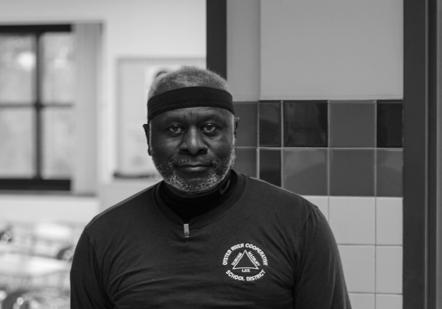
Mouth of the River seeks to reliably inform the student body, as well as the surrounding community, of in teresting and newsworthy content in a modern, compelling format. Our goal as a staff is to give a voice to the students of Oyster River, and have it heard by any and all of our readers.
This year’s staff of Mouth of the River is all about continuing to evolve, specifically this issue. This is our first issue since losing two of our returning staff members, Jake Garner and Conrad Dundorf, who both graduated early to pursue activities in places far from Durham. Since the departure of two of our most creative minds, we are not only a smaller staff but we must also challenge each other to grow our knowledge of journalism and eye for design. We are excited for you to see the things we have been up to since issue two, and hope you appreciate the attention to detail and emphasis on design in our newsroom.
We look to refine our work more and more with each issue of Mouth of the River. As a staff, we have taken many steps to broaden our understanding of what a good minimalistic, yet visually captivating magazine should contain. This quarter, Mouth of the River had the opportunity to attend a workshop on student journalism at Columbia University. Despite our tight deadlines, Mouth of the River bought bus tickets and headed down to the city for three days to surround ourselves with inspiration and information on journalistic writing and design from some of the best in the industry. After listening to New York Times editors and Huffington Post writers, we as a staff left feel ing more excited and energized than ever. We can’t wait to apply all the information we learned from this valuable experience.
At the conference we had the opportunity to hear from other news magazine advisors about ways we could im prove our publication. One of these changes is that our cover is once again a reference to a theme or major story in the issue, and no longer an image dependent on the season. For the MOR staff, Issue #3 was all about continuing to improve despite changes. We hope that for the reader, Issue #3 is all about learning about the world around us. From our article on how Oyster River alum are doing at college, to what it is like to attend high school in other countries, to learning about the beloved Oyster River custodian Ben Ball, we hope you finish reading this issue with a little bit more of an understanding of our community and world.
This issue is dedicated to Ms. Raiford and her struggle against cancer. She is a teacher whose positivityandinsighthavetouchedsomanyof us hereatOysterRiver.Wewishherastrongrecovery.
As always thank you for your support, and happy reading.
Isabelle Todd Editor in Chief
















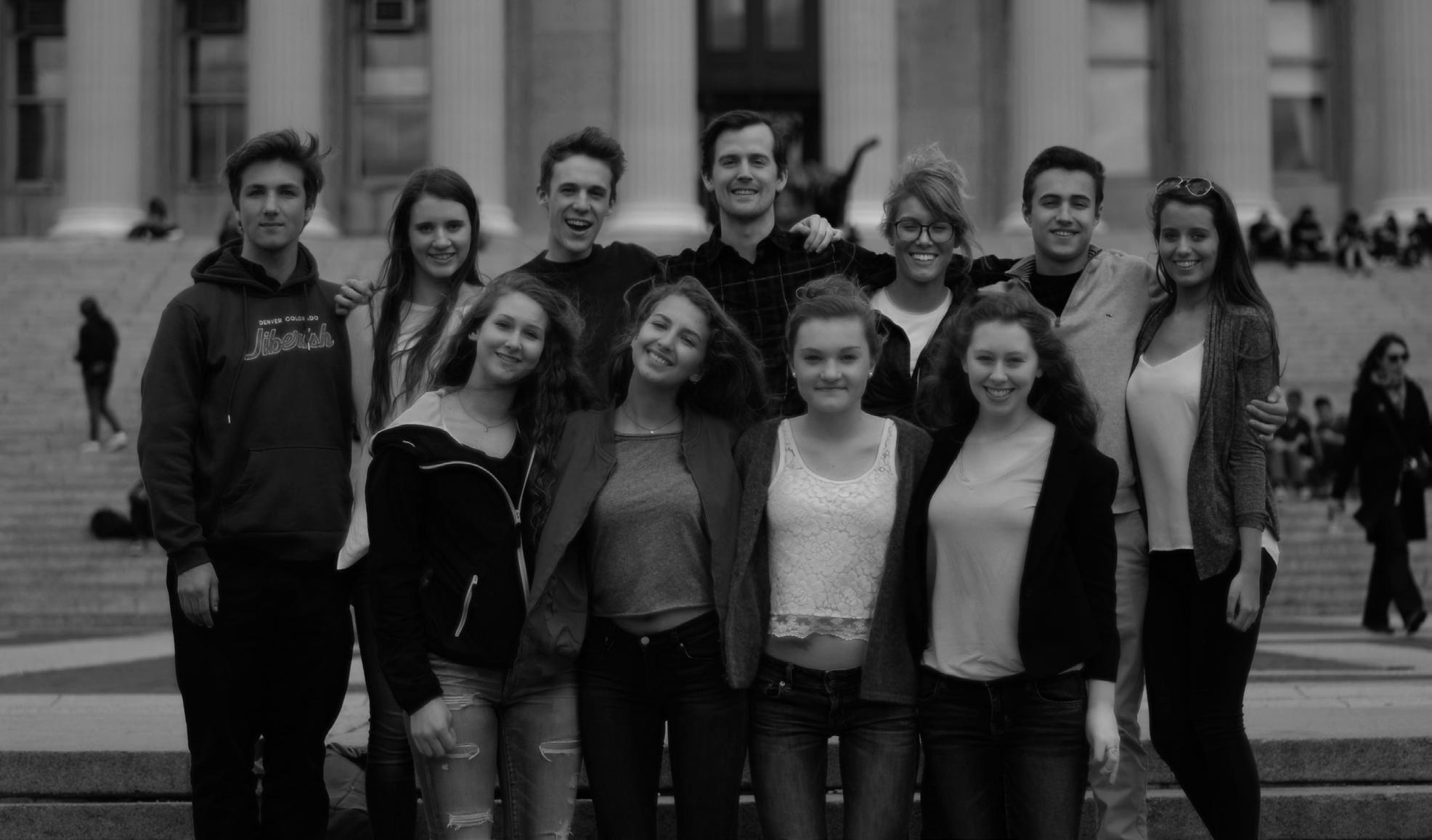
“Bedford has a beautiful school, but I meant what I said: You develop way more character at Manchester West High,” explains New Hampshire raised comedian, Seth Meyers. This is in response to a recently growing trend of NH parents voting to pull their high schoolers out of Manchester school district, and send them instead to more sheltered communities, like Pinkerton Academy in Derry. There is a growing inter est in sending students to more ‘sucluded’ school districts and communities, similar to the one we have here at Oyster River.
In hindsight, being a part of a privileged learning commu nity seems to have only benefits. Being a well-funded school allows for smaller class sizes, updated technology, and a wide range of internship opportunities appointed to students. In turn, this may be a significant enabler for students’ success.
Although some argue that along with these clear bene fits, there are some drawbacks to growing up surround ed by only privilege. Not only may some take for grant ed these advantages, but it also has caused a stigma of Oyster River students from those in different schools.
Rochester resident and Spaulding High school student Brooke Landry (‘17) explains, “I believe
Oyster River takes the lead financially compared to most schools in New Hampshire. In my opin ion Spaulding isn’t nearly as well kept as ORHS.”
Landry explains at the high school level, the amount of privileges provided doesn’t have a significant impact to shaping students’ success. She states, “There is a notion that being wealthy translates into you being more educat ed. Although some wealthier schools have updated tech nology or more classes, it doesn’t at all reflect the kinds of students at these schools, and their drive to do well.”
Oyster River student Jenna Howland (‘16) has a similar point, explaining, “I think that growing up with all these advantages [at ORHS] may lead to students having a bit of a superiority complex, looking down at other schools that aren’t placed in a generally wealthy community like Oyster River.” Although there may be an aspect of entitlement in the district, Howland explains the importance of recognizing the advantages we have, and the positive impact that has on students. She explains, “I think that Oyster River’s counsel ing department make it very possible to form a schedule to fit our needs. I feel like we have more control over it than other
 Artwork
Artwork
schools have. We also have open campus, which is available to most of the upperclassmen at our school. Some of our classes also use materials that might be unavailable to other schools. For example, art classes at Oyster River allow us to use a very wide variety of materials including oil paint.” Howland believes access to such things is imperative in or der to truly explore the academic fields you wish to pursue.
Oyster River student Arianna Stroheker (‘16) also acknowl edges the academic benefits of being at a privileged public school, but believes that the entitlement that a lot of students have may trump the benefits that Oyster River offers. “I
privileged. I am so lucky to live the way I do and have the things I have. I think because I am also surrounded by other privileged kids, I can sometimes take for grant ed the lifestyle I have and forget not everyone may be in such a stable financial situation. Growing up in a town where many are very privileged, being that kid who can’t have those things, I can imagine they may feel isolated.”
Zottoli expands on this potential feeling of isolation that some of his students feel who aren’t financially sta ble. He explains, “Because there are more people at a school like Dover, I think it is easier for kids to find their
think one of the major disadvantages of being exposed to that privilege early is that you can’t see past it. You think every school is like this and that everyone has great teachers and facilities and that nothing really differs. I moved here from Rochester in 4th grade so I’ve seen how bad schools can be. Even in elementary school, I saw a difference.”
Brian Zottoli, ORHS social studies teacher believes he has witnessed a similar contrast while teaching at different schools. He explains, “I have worked at Dover, Portsmouth, and Winnacunnet High School; there is little diversity here at ORHS, but I think size also has a lot to do with this. With larger schools you have much more defined socioeconomical
niches where they feel comfortable with who they are and their situation. While at ORHS, because there are so few kids and you all have been together for most of your lives, there’s a need to fit this one persona, which here hap pens to be this well-off, patagonia-wearing teenager.”
Another important aspect is to look at the post grad life of Oyster River alum, and the advantages and disadvantages of going into the “real world” from a privileged background. Col by Runk, ORHS alum (‘14) explains his experience, stating, “I didn’t consider Oyster River wealthy when I was in school. I didn’t fully grasp the privileges of the area until moving some where else, and until speaking to some of my peers in college.”
ly challenged areas. There are students who live in state spon sored housing. You get students who tend to be less inclined to do things at home and parents who aren’t quite as involved.”
Zottoli explains how this lack of diversity can have nega tive effects on those in the district who aren’t as privileged, and that it is essential to acknowledge these students. He explains, “At Oyster River it is very hard to recognize when students don’t fit the mold. Kids blend together, so there are a lot of generalizations that everyone at OR is well off,or everyone has a car or a nice house and that is just not accurate.”
ORHS student Henry Bulkley (‘18) admits he can forget to acknowledge this. He explains, “I will admit I am very
Oyster River is known for having great academics, suc cessful sports programs, and driven students. Although the consensus of many would be there needs to be a greater acknowledgement of priviledge. Students must take advan tage of the facilities and opportunities they have access to. Runk concludes, “For students like me who spent their entire childhood in the district, I was rarely exposed to the issues that other high school students my age mayww had faced in poorer districts. I loved my experience at Oyster River, but we grew up in a bubble.”
“At Oyster River it is very hard to recognize when students don’t fit the mold. Kids blend together, so there are a lot of generalizations that everyone at ORHS is well off, or everyone has a car or a nice house- and that is just not accurate.”
“Growing up with all these advantages [at ORHS] may lead to students having a bit of a superiority complex, looking down at otherschoolsthataren’tplacedinagenerallywealthycommunity like Oyster River.”
Jessie Stelter
e’s a really mo tivated guy and you can tell that he puts a lot of ef fort into whatever he does, and I’m sure he’ll put every thing into coaching this sea son and the foreseeable fu ture,” says Thomas Cote (‘17).
a successful team,” says Reilly Webb (‘15), who played four years of lacrosse with the Oyster River team. “My ideal coach is a strong leader that has an ability to ana lyze a team’s overall skill set to determine exactly what needs to be done for the team to get better. Communi cation between the coach and the players is also essen tial,” Webb continued. With a unanimous vote, Sulli van seemed to fit the profile of what the players, as well as the district, is looking for in a new lacrosse coach.
At the end of the 2011 la crosse season at Oyster River High School, Bill Sullivan stepped down from the coaching position to take on the full-time re sponsibilities of being vice principal at Oyster River Middle School. Four years later, at the end of the lacrosse season in 2015, former head coach Vince Bahl stepped down, prompting the district to post an opening for the position. Sullivan immediately expressed interest, and was elected out of three can didates for the position. After four years, Sullivan is back and prepared to take on the 2016 spring season.
Bahl coached boys lacrosse at ORHS for two years, starting in the spring of 2014. “Coach Bahl was very me thodical in his coaching. He clearly had the experience and technical knowledge of what was needed to build
Thirteen years ago, Bill Sullivan and Mark Hen derson made the decision to try to start up a lacrosse program at Oyster River High School. The team be gan at the club level, but throughout the years it has grown into one of the most popular sports that the school offers, attracting over 50 boys between junior varsity and varsity. “I’m excited to see that along with 15 plus years of coaching experience, I think he’s going to bring the level of intensity up in the pro gram,” says Corey Parker, Athletic Director at ORHS.
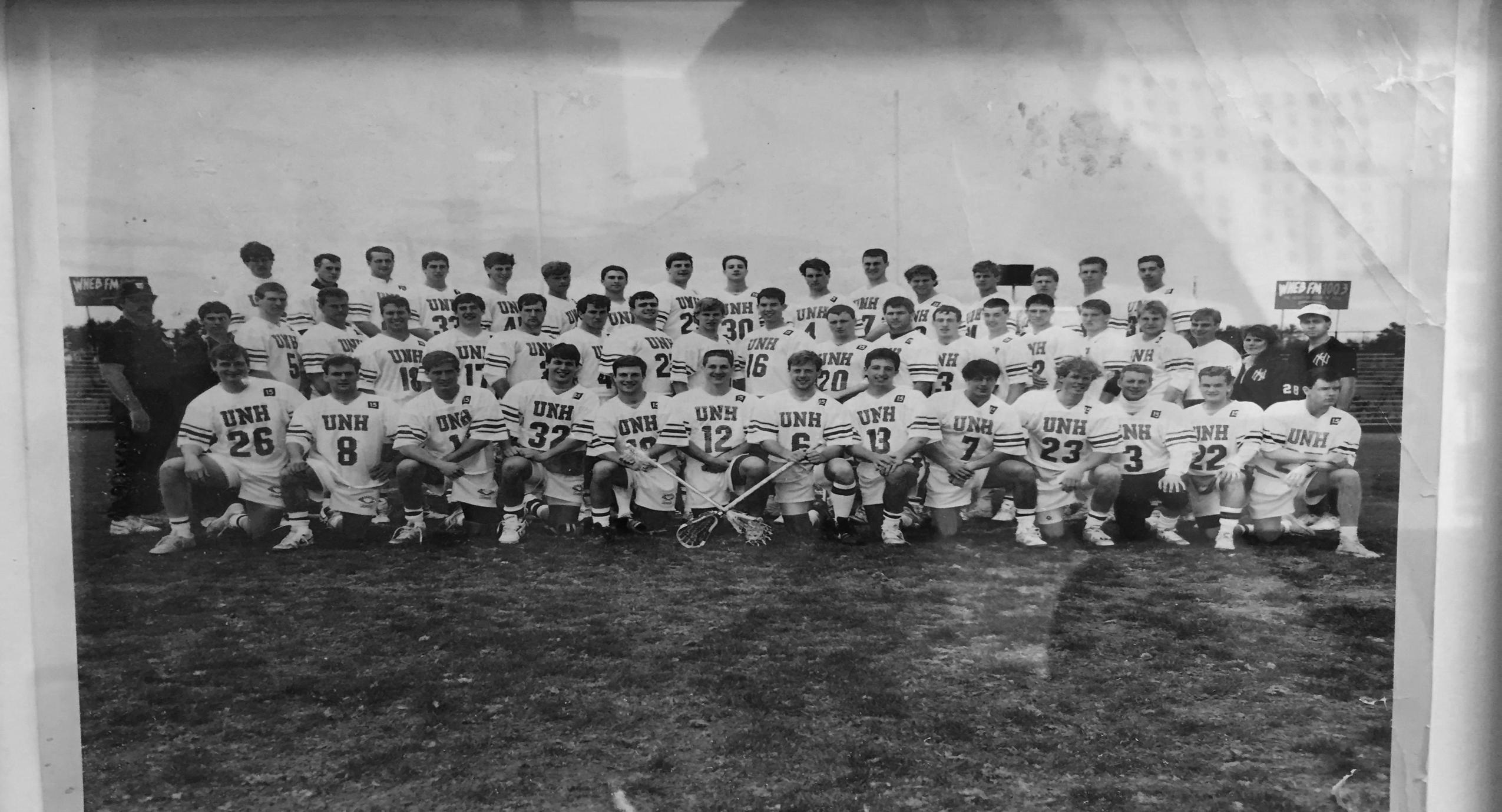
At ORHS, the players are passionate about their sports and are excited for a change. “I’ve had him as a coach for summer camps and clinics in the past and all of my experiences with him have been great. I like that he has a history playing lacrosse, so he knows what works best play-wise from experience,”
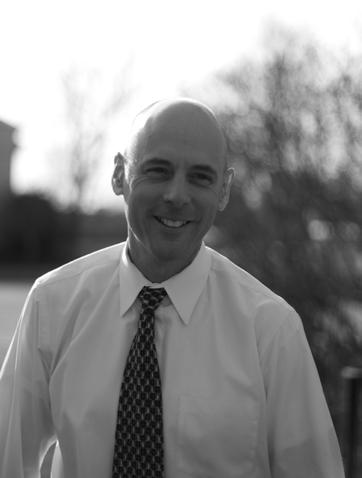
says Cote (‘17), who will be playing his third season of OR lacrosse this spring. Sullivan has had over 15 years of experience with kids in youth programs, ad ministration, and coaching, all of which will help.
“I’m excited to see his enthusiasm and school leadership style come into play with the team being the assistant principal at the middle school and an educator his entire life will help embrace the cultural piece,” says Parker.
Some of the ORHS lacrosse boys are familiar with Sullivan and his coaching tactics, as they attend ed either clinics or lacrosse sessions run by Sullivan.
“I am very excited to have Mr. Sullivan as a coach this year. He is very hands-on and gets involved in all of the drills, which is great and helps kids learn. Coach Sullivan has already shown a huge commitment to bettering the lacrosse program at ORHS, which is a great trait for a coach to have,” says Troy LaPolice (‘17). This will be LaPo lice’s third year of high school lacrosse, as he had played with Sullivan as a coach prior to this upcoming season.
Sullivan is familiar with the game of lacrosse, as well as team dynamics, as he was a ‘wildcat’ at the University of New Hampshire. Sullivan played la crosse all four years of college and prior to that Sullivan played for his high school lacrosse team.
“I think playing lacrosse throughout high school and college has given me a great background in the game but also the opportunity to be coached by some excellent coaches. I’ve learned a great deal from all the coaches I’ve played for and hope to utilize many of the great things they taught me,” says Sullivan.
With all his experience as a player, Sullivan has also developed himself as a lacrosse coach too. Sullivan will be returning to the high school playing field. “I’ve been coaching lacrosse since 1992. I started out by coaching youth lacrosse for ORYA and also Cocheco Lacrosse in Dover. I then coached the Oyster River High School team from 2005 until 2011 and since then have been coach ing my son’s U9 & U11 lacrosse teams,” says Sullivan.
And with each coach comes different tactics, drills, ideas and season goals. Some of those goals include us ing the new fields and facilities proposed by members of the ORCSD community. Not only do the season goals pertain to the new facilities, but the dynamic of the team as a whole. “On the field I’d like to see players working hard to improve as individual lacrosse players as well as working to develop as a team. I also want to be respect ed in the state as an opponent who will play hard for the entire game as well as the entire season,” says Sullivan.
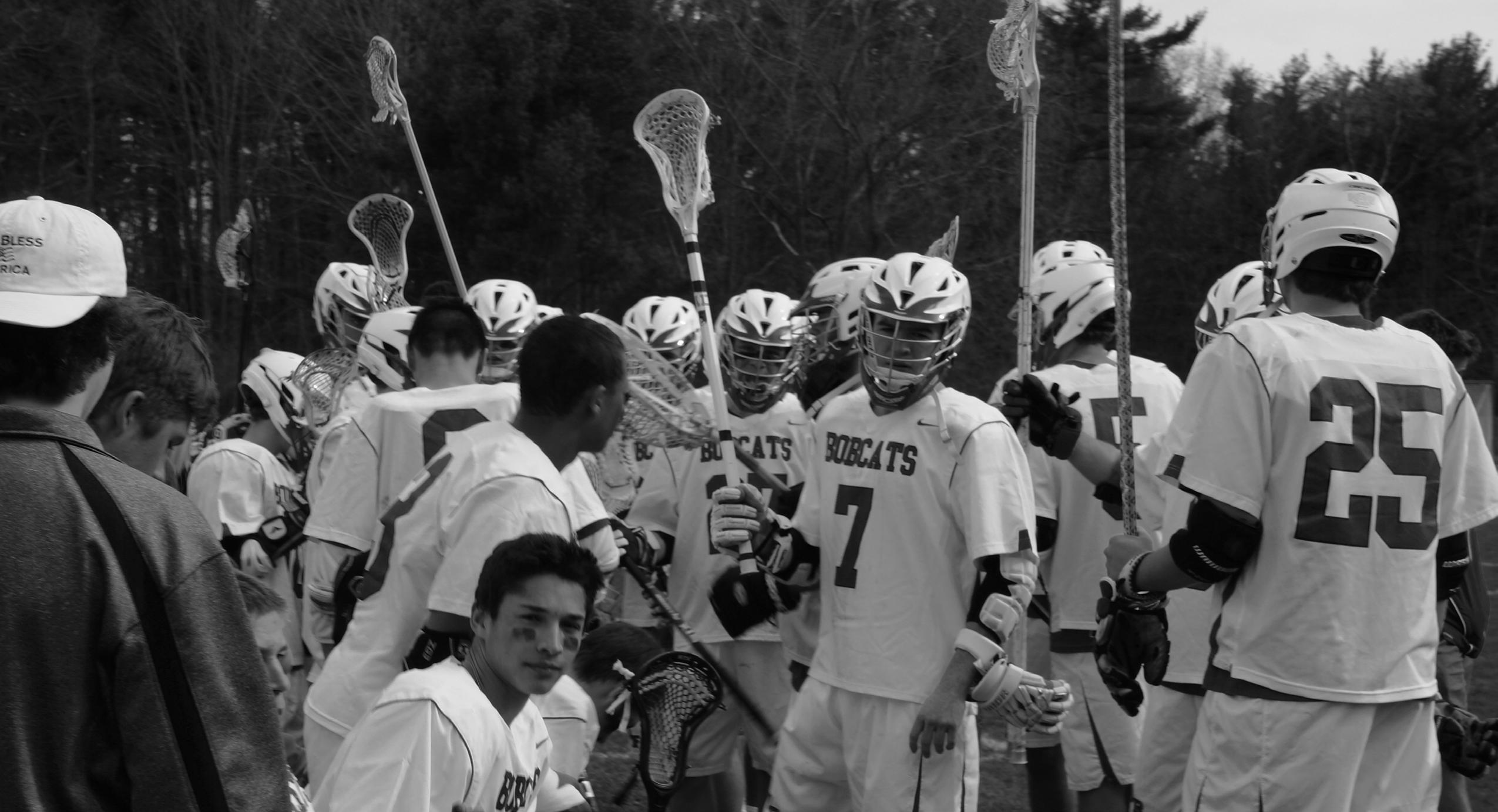 KATIE SCHMITT AND NEVILLE CAULFIELD
PHOTO CREDIT: THOMAS COTE
KATIE SCHMITT AND NEVILLE CAULFIELD
PHOTO CREDIT: THOMAS COTE
“I struggle with the idea that all my freshmen are capable or ready to make a big difference. Sometimes I see my students as feeling re ally overwhelmed by the prospect of changing the world,” said Kar en VanDyke, social studies teacher at Oyster River High School.
The Power of One is a project done by nearly all ORHS freshmen who are taking the required World Cultures class. Each individual or team must choose a current issue that they are passionate about, research it, and take action. This action part can either be completed through raising awareness, raising funds, or collecting items to help the cause. This project is notorious for its work and stress load on the freshman class.
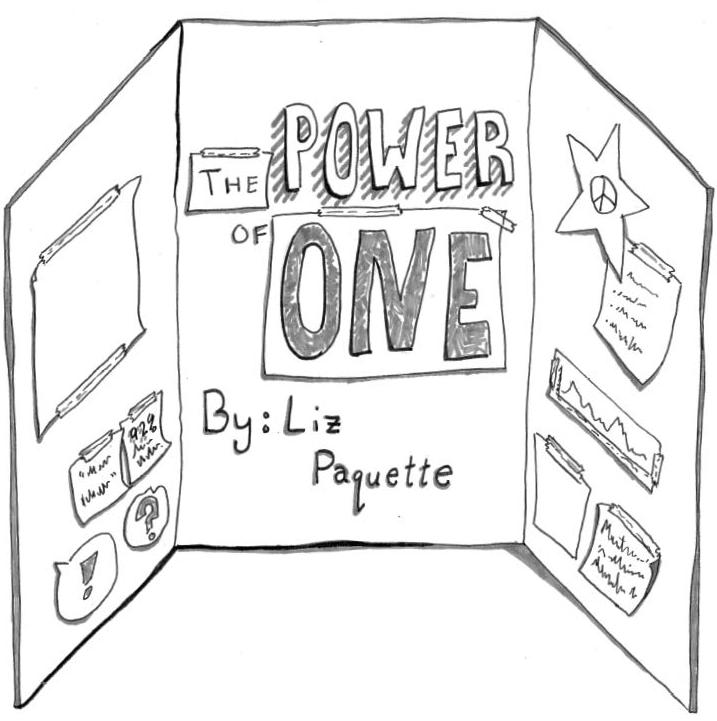
When a rumor saying that some freshmen weren’t doing the Power of One this year started circulating through the school, upperclass men reacted immediately. Some upperclassmen have been upset by the fact that not all the freshmen are doing the Power of One project, either because they think the freshmen will miss out on a valuable
experience, or because they think that the freshmen should have to work as hard as they did.
Pam Raiford, creator of the project, will be absent for most, if not the rest of the semester due to illness. The project may not still hap pen due to this, but there was already previous debate about the fate of the project.
An anonymous source said “They should’ve suffered through it like we did. It was a lot of work. But I think kids are more focused on the grade and not how they affect change.”
James Thibault, ORHS science teacher, commented on this after hearing his student’s reaction to the Power of One possibly not hap pening. “It’s like spirit week in the fall where [the class of 2016] was picked on as freshmen so therefore they need to have payback. There’s this need to make other people go through what they perceive to be the same thing.”
Not all of the upperclassmen agree with their peer’s reactions,
though. Forrest Mitchell (‘18) did Power of One as a freshman, and stated that: “It was really stressful because I hadn’t really ever done a project as large and time-consuming as that. But the project most definitely affected me for the better. It helped me understand all of the problems in the world and why I should care about them.” Mitch ell believes that the World Cultures classes should continue with this project. “It’s informative and I think it’s a necessity and that it will help the [freshmen] prepare for future projects that might even be on a larger scale.”
Raiford decided to create this project to help students become more aware about the world. “I always felt like I left them totally over whelmed by the world they live in,” she described. “That just felt bad. The whole idea of Power of One was to help them think about the fact that we live in a world that’s very daunting, and there’s so many is sues facing us. But it’s always been humans who have created change. To help them see themselves as agents of change in the world is [part of Power of One].”
Gabrielle Anderson, a new so cial studies teacher has also been changing her plans for the Power of One. “I think that any large proj ect in any grade is stressful. I think that’s just the nature of it. I was at a school that had a senior project, and [seniors] would tell you it was stressful.”
Anderson has been trying to change the project so that it is more group based. She bases her tweaks to the project off of the feedback she receives from her students. “The more feedback we get from students about what worked and what didn’t work, we can make the [Power of One], as some of the up perclassmen would say ‘easier’,” she said in reply to some of the reac tions that upperclassmen have had to the changes. “But I think the issue is to make it feel that the focus of the project is on students thinking about making a difference. The focus is not on the minutia.”
Gabbe Albert (‘19) is over halfway through World Cultures and her class hasn’t done much with the project yet. “I think this project is very different from most finals, but I like not having another test. Study[ing] hard and for long periods of time for tests is extremely stressful,” she remarked. “I don’t find this project to be too stressful. There are plenty of topics to choose from and the project is open to creativity and interpretation. It also gives us a chance to make a change.”
Another teacher who has been making changes to the project is
Karen VanDyke. She has been assigning the project on and off for a couple of years now. “Last year I did it differently, and we actually did the Power of One throughout the whole year, and as a class we supported each person in whatever endeavor they went on,” she ex plained. “If a group did a fundraiser everybody kicked in and helped and supported each other that way.”
VanDyke explains: “It’s a very worthwhile project. I feel as though with a project of that magnitude, and something that is so involved, each teacher should have some leeway and kind of morph it into something that they can actually promote in their own way. It’s hard to say one size fits all. I have to work it through so that I can sell it to the kids too so that they can be successful and that it will be a positive interaction for them.”
Most people can agree that there is a lot of good that comes out of the project. “It taught me how to get involved in the community more,” said Joe Green (‘16). “Lots of colleges are looking for community service and lots of kids don’t know how to get involved in it, but this helped a lot to get me involved.”
In the years that VanDyke did not do the project, her classes did something very similar. Her stu dents researched a topic they were passionate about, learned what was being done about it, and shared it with the class. This is the exact same process as the Power of One but without the action part of it.
“We did all the groundwork and the same kind of [research], and the part of it they didn’t do was the hard piece, which is actually going out in society and trying to make that change,” explained VanDyke. “It wasn’t like ‘ah, forget it, we can’t change the world, there’s no reason not to be looking at issues.’”
Raiford was planning on adding a new component to the project this year. Instead of having her stu dents create a brochure, they would have created a mini presentation and describe why people should care about the issue they chose to research. She was making these changes in an attempt to help with stress and to practice presenting for the final event.
Raiford knows that some kids just don’t care and don’t want to do the project at all. “But I think that’s true for a lot of things in school, for some students, and this is a better thing to drag them through than a traditional exam because they’re going to have to work on things that are important in the world,” she explained. “So are some kids going to like this more than others? Totally. But I see the value in asking them to do the small components that make up the project.
“I often hear that we have an educational environment that doesn’t allow students to fail without giving them the opportunity to be successful.
So I think embedded in The Power of One for some kids is this ability, they can fail or fall apart and then regroup.
I’ve had so many examples of students; where they’ve started and ended is just totally amazing.”
s technology evolves, we evolve with it. Since so much has been invented in recent years, there’s a significant difference be tween how school started out with the millennials and how it is now.” says ORHS student Sophia Haley (‘16).
Walk into any modern day high school—public or pri vate, big or small—and there most likely will be classes constructed around the use of technology. Whether it be using laptops to do research, or an interactive activ ity on a promethean ‘Smart Board,’ it seems as if most teachers nowadays are dependent on these tools to run their lessons. The question arises as to whether this push for new technology in classes enables more effi cient learning, or has created a new co-dependence that may limit the depth of learning in the classroom.
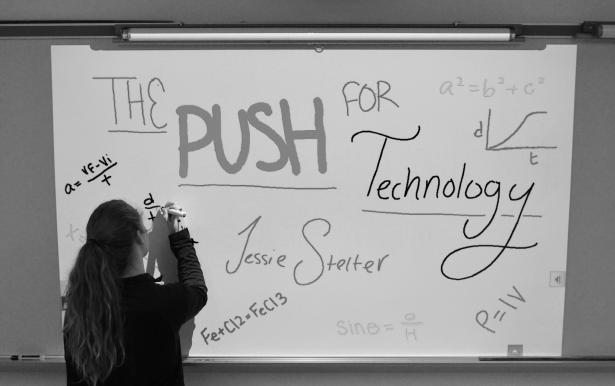
Haley explains the benefits of this technological push, stating, “Technology can save time, energy, as well as resources. It also really helps when trying to get work done in class. It can also help a teacher relay an idea onto the students without it being confusing, and it can help teachers with disabilities or difficulties. An exam ple of this would be a smart tablet to write notes from afar. Things like this make it so much easier for stu dents.”
ORHS student Victoria Madore (‘17) explains the evol tion of technology she witnessed from being a young
student in elementary school. She says, “As technology evolves, so do teaching methods. I remember being in 4th grade, and using floppy disks to store information. Today, the ‘cloud’ has replaced that, and smart boards have taken the place of a chalk board.”
ORHS science teacher Sarah Cathey expands on this evolution from her perspective, stating, “I’ve been teach ing for fourteen years, and I’d say the first five to seven teachers, including myself, were a little intimidated to heavily use technology in the classroom. It used to be utilized just by the technologically savvy, but recently technology in the teaching profession has built up a lot of momentum, and now it is here, and here to stay.”
Haley explains how much our use of technology has shifted into an everyday occurrence. She states, “A fair amount of technology is used in my classes. In AP chem istry, smart boards and autographing devices are used to do the math for you. Computers are used almost every day in my art history class to view and analyze paintings and drawings on a larger scale. In sociology, there are many movies and documentaries played out on the pro jector... I’d say in most cases, three days out of the week are spent on technology (whether if it’s a phone or a com puter) in every individual class.”
Catherine Moran, a sociology professor at the Universi ty of New Hampshire, uses technology every day to
construct her classes. She explains, “I tend to use tech nology in every class. I also have moved to a format of using more ‘open educational resources’ which includes online free readings in lieu of traditional textbooks. I can also amend and adapt these as I need to, so the tech nology allows me to personalize my class materials.”
Madore brings up another aspect, explaining, “Tech nology can be a great tool, as it can be used in an ef ficient manner to take notes, research topics, and en gage with the class. However, the use of technology in classrooms can be abused when students see it as an opportunity to not fully engage themselves and not pay attention.”
Moran has a similar viewpoint and expands on this observation from an educator’s perspective, explain ing, “Students are so immersed in technology that it has shift ed the baseline. It is no longer the case that technologies like online delivery of quizzes or exams is novel or new anymore. But these tools, while expected by students, aren’t necessarily mo tivating students; rather, there are some students who look at the tech tools as ways to better entertain them.”
Haley believes that she has witnessed many disadvantages with the use of technology not only at Oyster River but also schools around the country. “The biggest disadvantage that I see in all of this is that many times students end up relying on technology (computers, phones, smart calculators) fully. That can go for any class as well. I have two classes that use tech nology rarely, but I guarantee with these classes, along with others, every homework assignment will have something to do with being on a computer or phone.”
Whether the advantages weigh out the disadvantages or
not, for many teachers, balancing out technology and tra ditional teaching techniques isn’t always an easy process. Cathey explains, “I am still constantly learning how to in corporate new technology in my classes. It is still a learn ing curve. I have to read about new equipment, experi ment with new things, ask questions, and make mistakes.”
The rapid progression of new equipment in the class room can also take students by surprise. UNH student and ORHS alum Claire Hawkes (‘14) explains, “Technol ogy has come a long way even since I was in high school. I remember teachers rolling out a projector and writing on plastic slides so that we could take notes. Now everything is auto matic and installed in the ceiling.”
Haley explains the inconsistency with her thoughts on technol ogy. “I am very engaged when we use technology in classes, but I think teachers and stu dents get so caught up in this usage we don’t realize just how much we’re dependent on tech nology. And I think we especial ly don’t realize how little we are off it. It’s hard to say if the direc tion we are going in is good or bad.” There is a trend in the uncertain ty surrounding whether or not this push for technology is beneficial or not. Whether com ing from the students or the teachers themselves, this technological progression can be useful, or can be over whelming. Hawke concludes, “The age that we live in and the fact that technology is progressing at such a quick rate is the reason we are experiencing all of this technology in the classroom. Many believe that tech nology will make life easier for everyone, but some times it just complicates things and at those times I wish the professor would just write on
the whiteboard.”
“Students are so immersed in technology that it has shifted the baseline. These tools, while expected by students, aren’t necessarily motivating students; rather, there are some students who look at the tech tools as ways to better entertain them.”
“I think we especially don’t realize how little we are off it [technology].
It’s hard to say if the direction we are going in is good or bad.”
“Evan’s passion for music is inspiring, and being one of his closest friends, I have seen his determination and hard work first hand. It hasn’t been easy for him, and producing a single piece of music may take him over ten hours to complete, but when finishing a song it makes him so happy. He takes a lot of pride in his work and he needs to be heard,” said Maegan Doody (‘16), a lifelong friend.
Evan Gordon was introduced to music as a child when his parents signed him up for piano lessons, the more traditional way of learning the piano, as a kid. Instructors encourage kids to memorize notes, practicing over and over until they can recite a rhythm with their eyes closed. “Evan has been singing and playing the piano for as long as I can remember. We both started out taking lessons when we were younger and he was just absolutely amazing at it,” says sister Laurel Gordon (‘19). Gordon was not your traditional student. He would go off the books and make up his own melodies, becoming more dependent on playing music by ear rather than sight reading music straight from the books.

“We brought the piano up from his Great Grandmother’s house in New Jersey and his Dad moved it into the house. For Evan, he was drawn to it immediately and as soon as he sat at that piano, it was like he belonged there and since it is like he’s never really left it,” says Amy Trafton, Gor don’s mother. Soon after, Gordon began teaching himself music, with the fundamentals learned from his short time with the piano teacher. Gordon would spend hours on his piano composing his own melodies. “My parents signed me up for lessons when I was five or six, and I started from scratch so I would learn proper technique, but even then I was already composing. I never loved lessons and at times even dreaded them because I couldn’t do everything my own way. I had to read music, which I struggled with because I could usually just rely on my ear, and I had to play music that I didn’t like,” said Gordon.
Although he dreaded lessons and disliked the classical music that they pushed him to play, it wasn’t all a negative experience. “The director of the program at UNH I took lessons through, Arlene Kies, saw something in me when I first started and took me under her wing. She was probably the one who kept me in lessons for so long and did everything she could to keep me from quitting,” said Gordon.
Gordon likes to perform for audiences as it’s something he’s become com fortable doing. Gordon recently published his songs to the popular music archive known as SoundCloud, accessible by both phone apps and through their website. Soundcloud allows producers, such as Gordon, to publish their music to a public audience. Gordon chose to link his Soundcloud to his Twitter account as well. The Permanent Rain Press, an online-based outlet, that works in association with a radio show on a campus-community radio station, used Soundcloud to find Gordon, and from there asked if they could play his music through their station.
“Coincidentally (or funny?) enough I oftentimes scour social media for new music. I probably typed in something like ‘check out my new song’ in the Twitter search bar and came up with Evan’s page promoting his new music. I’m really into some great pop/rock/indie tunes, and our radio show loves to feature artists who are relatively independent. Smoke To Blue has actually been one of my favorite finds off social media, because I was in stantly drawn to its dreamy, synth-colored tone,” said Chloe Hoy, co-found er of The Permanent Press.
Playing music was not Gordon’s only passion, but producing music using
computer software exposed Gordon to a whole other side of music.
Over the past four years there was probably the most improvement. This was the time he started to actually produce his own music on his software that he has on his computer. The quality of the music but also his enthusiasm and excitement for making new music is a lot better,” says Laurel.
Along with making music, Gordon listens to music just like most teens, but he hears something different. “I would say my two biggest musical inspirations are Lorde and Angus & Julia Stone. They are two very differ ent artists, but I admire them both so much. Lorde, for her fearless use of language and sound, and Angus & Julia Stone for their effortless sound and lyrics that evoke so many different emotions,” said Gordon. When he listens, he picks out harmonies and chord progressions that to most would just sound like everything else.
“I think that’s part of what makes me love a piece of music: how many different ways it can make me feel, how many different places it can bring me to and show me the world from,” he continued. Gordon often draws upon his inspirations when creating his own music.
In just a year or two, Gordon has learned to play different instruments and has taught himself how to produce music with different computer software and programs. He learned everything he knows about produc ing music on his own, which just goes to show how passionate he is about his music.
Gordon’s determination is evident through his music as well as other aspects of his life.
When he’s not playing the piano or writing a new song, Gordon is extremely involved in a wide variety of activities. In the fall, Gordon runs on the varsity cross-country team, helping the boys to be the state runners up two years in a row, and in the winter and spring he runs var sity track. Gordon also challenges himself academically, taking many of the most difficult classes that ORHS has to offer. “Writing music has allowed me to be really stable I think, mentally and emotionally,” said Gordon.
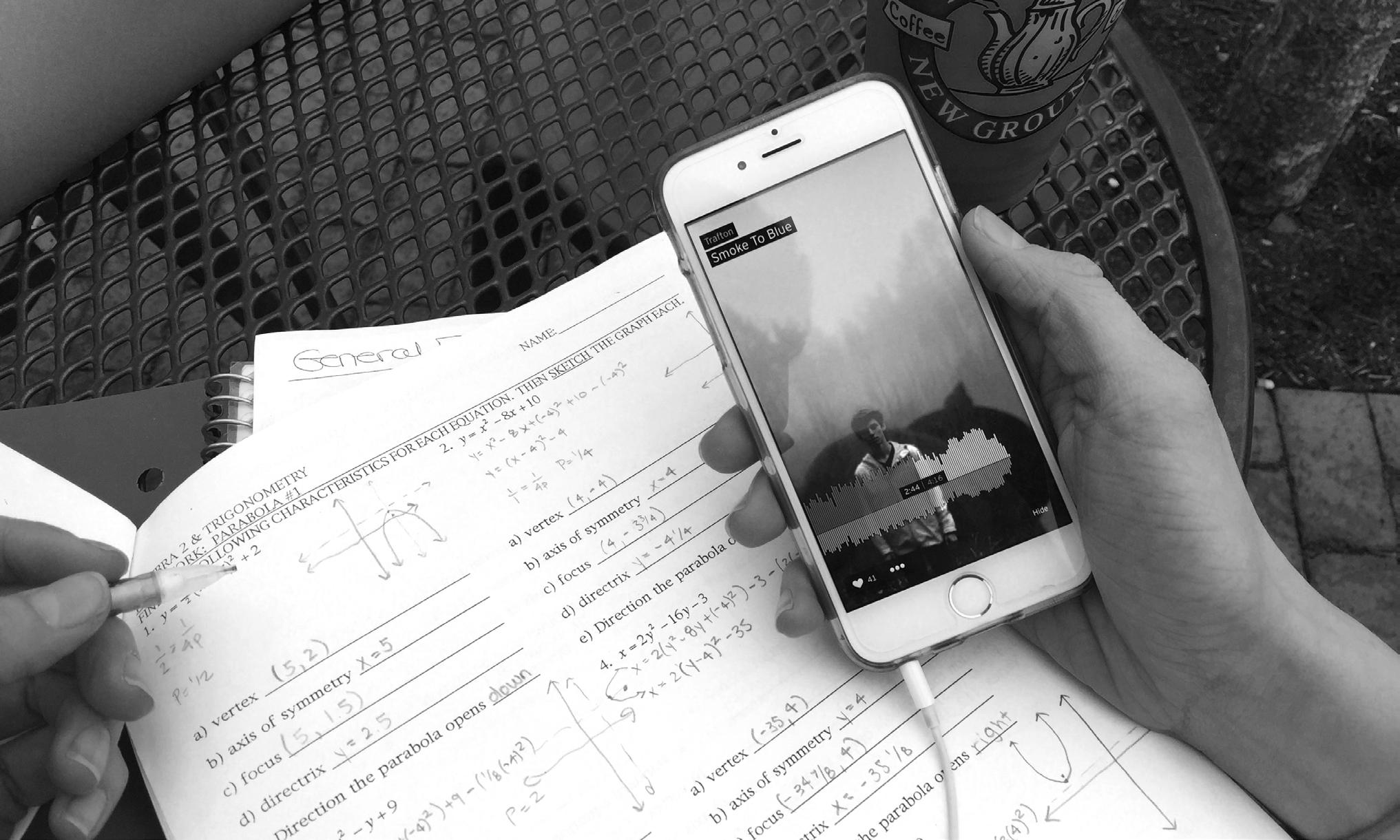
His teammates are influenced by his dedication, as Gordon is one of the co-captains on the boys XC team. “Evan has always had the char acteristics of being a leader. He’s always been a very mature kid who works hard academically. Evan is always willing to step up and do a job. No matter what he always is looking to help someone or some cause,” says teammate Aidan Yoder (‘17).
Gordon is not just involved in individual music production, but is also an active member of the Oyster River High School band. “My favorite part about performing with Evan is the energy he brings to the stage. He makes me feel relaxed when I’m singing with him. We always try to tell a story when we perform and Evan is such a great person to work with for that. I know that he will always have my back when we get on stage together,” says band member, and friend Caitlyn Miller (‘16). The ORHS jazz band is notable for the commitment and dedication shown from the band members.
Having been a beginner musician not too long ago, to any new artist Gordon advocates, “Don’t set boundaries. Don’t try to contain your art or limit your creativity to a certain style, sound, or genre. If you set out to go somewhere with a piece, and you end up going in a completely different direction, don’t give up or try to change where the piece is go ing. Let yourself be free when it comes to your art and allow your heart or mind to bring you wherever it wants to go and don’t be afraid of the unexpected.”
“When Evan plays, we simply shut everything else off and just enjoy the sounds of his playing. I have fallen asleep to it some nights. It’s had an enormous and profound effect on all of us,” said Trafton. In the fu ture, Gordon set his sights on the music production business, and hopes to become a producer himself. Gordon loves the idea of the big city and all that it has to offer, and hopes to end up in New York City either after high school, or if not, after college. “Evan’s future in music is very bright. I see him continuing to learn and improve and he’ll start getting people’s attention. He is dedicated to his music and, knowing Evan, he’s not going to give up,” Doody comments.
My mom grew up in Italy and always thought that they had a great education system; I’ve often wondered what it’s like to be a high school student there,” says Maddie Glass (‘18).
Education systems around the world are built for success, but what attrributes make them different? Seven students who have studied across the globe, from Mexico to Nepal, have given an insight into their high school life outside of the United States.
May Spencer currently attends Priory School in England. Prior to uni versity in England, you are offered a gap year where you can go traveling, which is what most students choose to do. You can also use the gap year to simply study, work, or be sent to a placement where you can practice the job you want to do in the future.
Although many countries other than the United States have viewed sports as unimportant in high schools, Spencer’s school offers a variety of clubs and sports such as health and fitness, trampolining, netball, tennis, rugby, basketball, and many more. The school year in England is yearround, with specific vacations throughout the school year.

“In my opinion, British schools are worse [than American Schools] be cause we have to wear school uniforms, which I find pointless because it disrupts learning when the teachers are constantly telling students off for incorrect clothing when education is more important the clothes someone is wearing,” says Spencer.
Renata Schaefer studied abroad at ORHS during the 2013-2014 school year. Schaefer’s high school back home is called the Instituto Las Americas de Parral in Mexico. One difference that immediately sticks out is that in Schaefer’s school you are required to be in calculus or you are not allowed to start high school. Schaefer’s school also often has the content of classes in another language. “The harder part [in Mexico] is that every single day we had 30 calculus problems in English and 28 physics problems also in English. History was another class that we had our book in English, so it was hard for us, but it really helped me,” states Schaefer.
At ORHS it is common for students to come in late to school with a par ent’s approval. However, in Schaefer’s school if you are late to school you get a “tardy note”. This meant that you were not allowed to attend the class you were coming late to, and in the meantime you had to clean the school and fields until the following class.
“Both USA’s schools and Mexico’s schools are great from my experience,” states Schaefer.
Ludovico Agostini studied abroad at ORHS during the 2014-2015 school year. Agostini’s high school back home is named after the world famous Leonardo Da Vinci. In Italy there are three different types of high schools, some of which you cannot attend college or university. Agostini attends the hardest of the three.
In Italy, rather than having a course selection as you do in ORHS, you choose a program that has a specific required curriculum; these different options range from a scientific based pathway (which is what Agostini is currently enrolled in) to an economics one. There is no homework in Italy but you are expected to study and be ready for tests. There can be a test every day, whether oral or written.
At Agostini’s school they have their own restaurant due to their large enrollment of 1600 students. However, on an average day, Agostini makes his way to a small restaurant right outside of the school where he can enjoy pasta, gnocchi, lasagna, and other meals for an inexpensive price.
“I really can’t tell which school is better since the two systems are really different. We learn more things than you [ORHS] but we don’t have a lot of lab time or awesome clubs or school teams,” says Agostini.
Hidalgo Del Parral, Chihuahua, Mexico Lewes, East Sussex, England Treviso, Italy
Ben Morris studied abroad in China at the International School of Beijing during the 2012-2013 and 2013-2014 school years. In Morris’s school, the major aspects of living abroad were the language and cultural barriers. “It can come as a surprise when you encounter these traditions and customs for the first time,” states Morris.
One the most substantial amenities at Morris’s school were the facili ties, which included a large indoor exercise facility with indoor basketball courts, an indoor soccer field plus two other generic soccer fields, a rugby field, and an outdoor track.
“My overall experience at the school [in China] was great but I think I would still prefer ORHS due to the fact that many of the people and friends I grew up with are still here, as well as the fact that I do not have to be flu ent in a different language in order to communicate with a large population of residents in the area [Durham],” says Morris.
Abrita Kuthumi moved to the United States when she was 12 years old. Currently, she attends Dover High School, but her old school was called St. Mary’s. In Nepal, there is no such thing as electives such as languages; every student learns the same thing, which are the core classes. Students stay in the same classroom all day, and teachers rotate among classes.
In Nepal, there were some extracurricular classes that changed every day of the week, but education comes before these activities so sports were not a big deal. For Kuthumi’s daily lunch she would order her meal similarly to in a restaurant and this could range from dumplings to noodles to pakoda.
Stockholm, Sweden
Martina Loefquist studied abroad at ORHS during the 2013-2014 school year. Loefquist’s school back home is called Kungsholmens Gymnasium and is located in Sweden. Similarly to Italy, in Sweden you choose a pro gram to enroll in for your entire high school career. The daily schedule in Sweden is not the same and, like colleges in the United States, most classes you only meet around two times per week.
When I think of Sweden I imagine cold weather and snow, and although this is mostly true Loefquist’s school does not have snow days. The only days off from school that they have are vacations, and “gray days” which are similar to teacher workshops in the United States.
Student life at Loefquist’s school has a variety of options. They have a large student union, which Loefquist is the treasurer of, in which they or ganize events, themes weeks and seminars. Recently they had a woman come in to speak to them about living through the Holocaust.
“What I would’ve liked is a combination between the Swedish and the United States’s school systems where you’re in a program with chosen classes for the first one or two years, and then have individual choices for the rest of your time in school,” says Loefquist.
“The school in Nepal was a lot tougher than here; in fact, I dreaded going to school there. The education was based on a lot of memorization and was lacking actual learning. Corporal punishment was norm. Discipline was also part of the educational system. Competition was high because there was an implication that only the educated people could succeed in life. I prefer the American system,” says Kuthumi.
Petter Sandvik is currently studying abroad at ORHS for the 2015-2016 school year. Sandvik’s high school back home is called Hadeland Vid eregående Skole and is located in Norway. Similarly to Sweden, in Norway you choose a program to enroll in for high school and may only have certain classes twice a week; Sandvik mentioned that some days he could be out of school at 11:00 a.m. and other days 4:00 p.m..
In Norway, homework is not required. You are given the option to practice material if you feel unconfident on the subject; however, students are not giv en assignments that they must complete. Sandvik mentioned that in Norway understanding the material is much more important than getting a grade for turning in homework.
“I like the senior and junior classes [at ORHS] and the sports here. In Nor way we don’t have sports in the school, just clubs. I also like that we don’t do the same thing [class schedule] every day in Norway,” says Sandvik.
“The world is full of opportunities. Being involved with FBLA will definitely look good and also real ly help you as a future business leader,” said Brennan Dwier (‘19), president of the new Future Business Lead ers of America (FBLA) club.
FBLA is Oyster River High School’s first business club, composed of only six students. According to their website, FBLA is an organization that was cre ated in 1940 to “bring business and education together in a positive working relationship through innovative leadership and career development programs.” Being a member has many benefits, such as discounts and cou pons, scholarships, publications, awards, and recogni tion programs. “It looks good on a resume and getting into colleges; there are many perks and benefits to it.” said Dwier.
different levels of education. FBLA is the level for high school students, FBLA-PBL (Phi Beta Lambda) is the level for college students, and FBLA-PD (professional division) is the level for FBLA-PBL alumni, business professionals, teachers, and anyone else who supports the organization.
Chapters of FBLA can participate in academic com petitions, where they can demonstrate their business expertise at regional, state and, national events. “We’re in the early stages now and we’re realizing our chapter and we’re getting responsibilities,” said Adam Lacasse, business teacher and advisor to the FBLA club. “Now that we’re a formal chapter, we’ll have a lot of informa tion passed along to us from FBLA and we will start participating in business-related competitions.”

According to Heather Healy, an economics teacher at ORHS, this club could finally become a possibility because of new staff and student interest. “I think we’ve been missing a business element here, and not because of people not finding it important but because we ha ven’t had the staff to expand on these programs. With trying to build computer science and cover economics,, there was very little room to include additional busi ness classes.”

There are also separate levels of this organization for
While the business department has been making an effort to expand, it was actually Dwier’s idea to create this club. “Dwier came to me with the idea of creating [the club], and now he’s been elected the active presi dent,” explained Lacasse. “He knew that we had a vi sion about creating a strong business program. I was in FBLA when I was in high school, and I knew when I got this job that we’d add organizations like this even tually.” Lacasse is currently working on adding DECA (Distributive Education Clubs of America) in the fu ture, a club that would be more specifically focused on marketing skills.
“My mom was actually the president of her FBLA chapter at one point and so was her twin brother, so I got the idea from her,” described Dwier. “I really want to pursue a career being an entrepreneur. I have a
variety of different ideas. All the [different compo nents] of business really interests me.”
The club of six members has meetings every month. “We’re starting off small, but right now we’re trying to develop ideas that will better ourselves as business lead ers,” said Connor Grady (‘17), vice president of FBLA. “I think this club is really going help me in the future with the career that I’d like to pursue. I’m taking all the business department classes next year. It’s really all that I’m interested in and plan on doing in the future.”
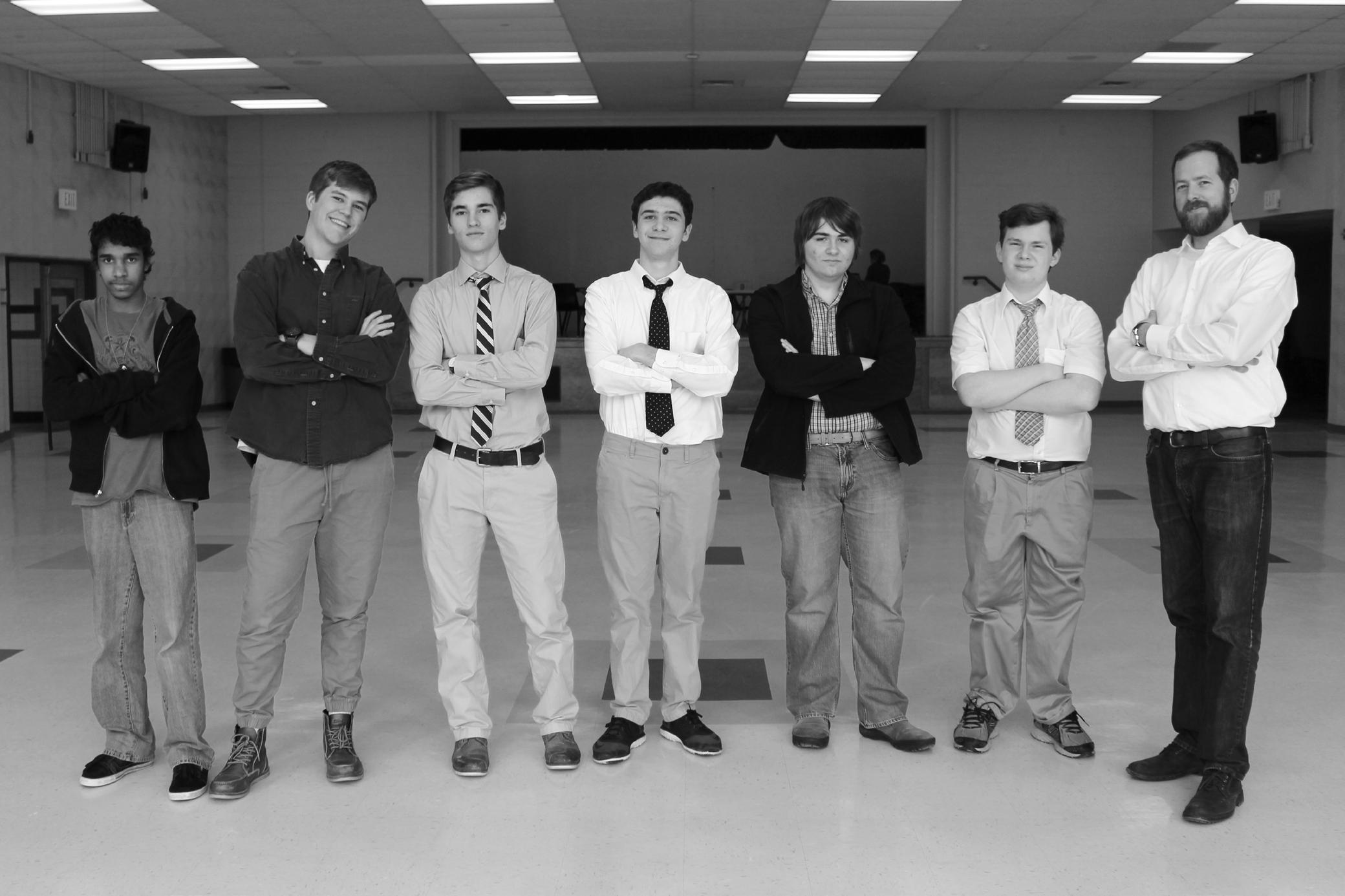
Since the club is just starting out right now, there’s not much to do. “Once we’re signed up with the orga nization we will learn about careers, do all kinds of ac tivities, have different kinds of speakers, etc,” explained Dwier. The club is still accepting members and will an nounce its upcoming meetings.
In the meantime, Lacasse is still keeping the FBLA members busy. “This semester FBLA is going to help me build curriculum for the new Introduction to
‘Business class next year, and they’ll each have a nar row focus and it’ll allow me to prepare for the class and they will learn valuable skills.”
People are still learning about the club and what it’s all about. Anna Stoll (‘18) recently heard about it and commented, “I am very interested, I think this is a very important club to have because it helps diversify the school.”
For those who are interested in the club, “Definitely take Introduction to Business next year. If you take that class you will be automatically in the club for next year, and for oncoming years,” explained Grady. “Just try to get into the business field a little bit, take a couple ex tra classes or just swing by for one FBLA meeting, I think it’d be really beneficial for those who might be interested.”
To learn more or to join the club, contact Adam Lacasse at alacasse@orcsd.org.
From left to right: Chris Keravich , Connor Grady, Thomas Cote, Dominic Mattioni, Louis Dufresne, Brennan Dwier, Adam Lacasse.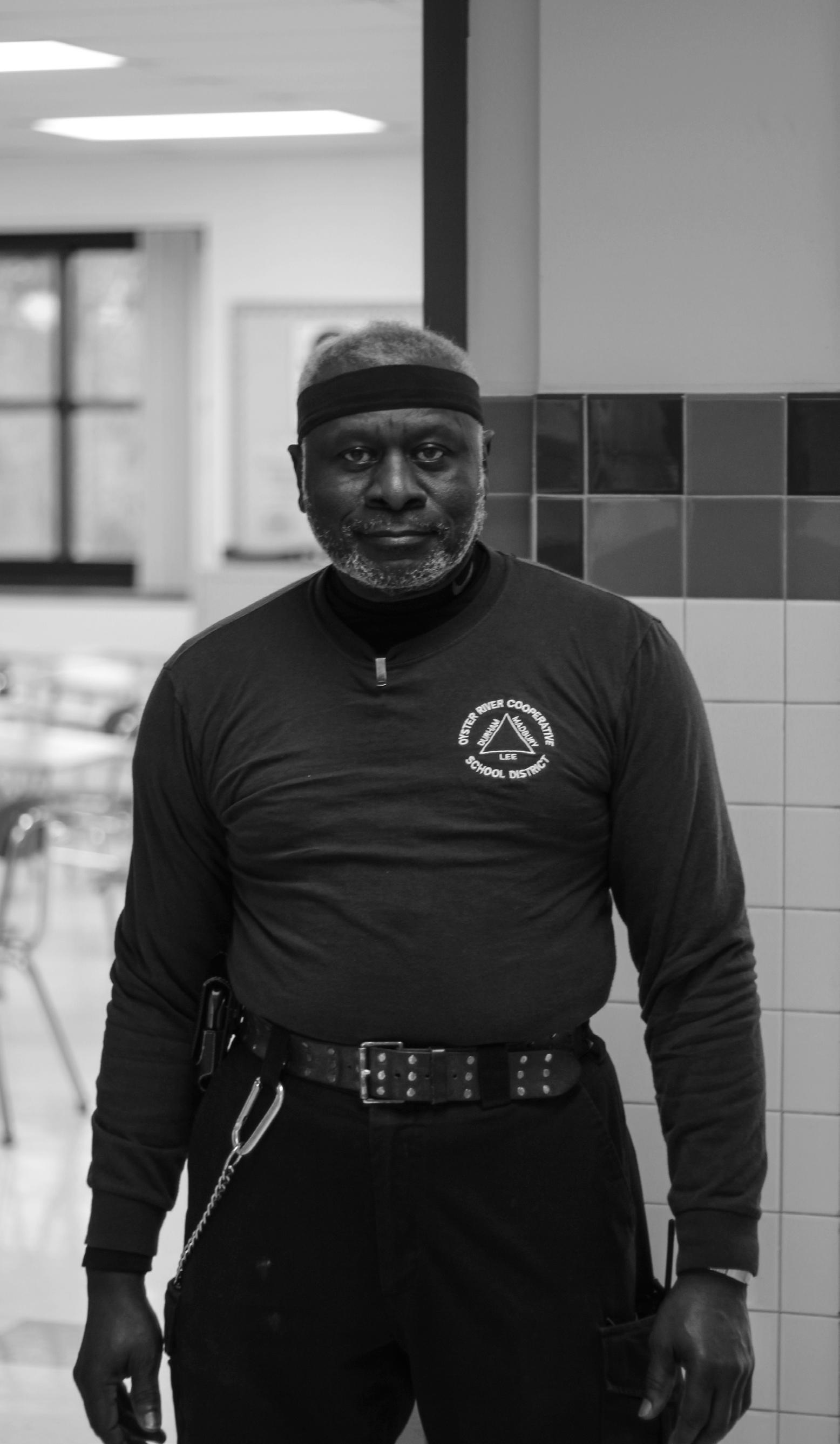 Dillon Mulhern
Dillon Mulhern
Normally seen dressed in a vest overtop his blue Oyster River custodial uniform, with a flat cap to top him off, Ben Ball will have worked as a custodian for the Oyster River School District for eight years when he re tires in May. At the high school, many students have sparked conversation with Mr. Ball as they leave the school after the school day. Talk to any one who has spoken with him and they’ll speak of a joyous man and give you a snatch of a story he told. Whether it was about his time in Thai land or the beheadings in Saudi Arabia, his sto ries are entrancing.
Born in 1950, Ball got his first job at the age of 13 at a local car wash in Boston. He joined the military at age 16 in the midst of the Vietnam War, where he was stationed with the Air Force in neighboring Thailand. He never saw combat but instead acted as a supply specialist invento ry manager, dealing with warehouses containing everything needed for the campaigning soldiers. During his time in Thailand, Ball met Janta, his former wife and mother of his three daughters, Weepargoren, Kanya, and Sarinya. He was lat er relocated to Guam, which he found to be far more enjoyable than Thailand.
“In Thailand I always had a fear of men [rob bing me] with knives,” recollected Ball.
In Guam, he created a stocking program that increased the efficiency of inventorying, which was soon adapted by other units. Guam is an is land in the north western Pacific that is occupied by US Armed Forces. To circumvent the entire island takes no more than two hours by car.
Ball took great pride in his work in Guam, much as he does at ORHS. “Ben is the easiest guy to work with, he seems always happy. He has a very good attitude, always smiling and that’s what you need. Sometimes our days get really busy and re ally frustrating. With Ben always smiling it gives the guys the motivation to finish the night,” said head custodian Marek Filip.
After being stationed on Guam for seven years, Ball was sent to Saudi Arabia under invitation of the king. “A guy asked if we [Ball and his com rades] had any IDs and we showed him the in vitation we got and he immediately saluted us. It was kinda really weird,” noted Ball. Saudi Arabia
was a dramatically different place than any Ball had ever experienced. “There were beheadings every Friday down in the square, and over my three-month stay there were one or two every week,” recalled Ball.
After Saudi Arabia he was stationed at various bases around the United States. “I was stationed in McConnell Air Force Base in Kansas and my brother was stationed there before me, and this guy thought I was my oldest brother, James. He asked me if I knew him, and I said ‘yeah, that’s my brother’,” said Ball, the middle child of seven.
When the last of his tours was finally complet ed Ball had served in Vietnam, the Cold War, and Desert Storm, 24 years of military service in all. Ball worked at Pan American Airlines. “I worked moving the luggage from the airport to the plane, and the vehicle you used had the worst steering, so bad you had to start [turning] from way far back, otherwise you had to backup. The mirrors could barely see anything so that was a hazard of its own,” recollected Ball.
Finally, Ball came to work at Oyster River Mid dle School as a custodian. “I’ve known Ben since [2006]” said Nate Fisk, a fellow custodian work ing alongside Ball.
“I’ve been working with him for a long time... He’s always chippa’, always happy no matter what. Very rarely do you see him not talk, even if he doesn’t know them and they’re walking by he’ll spark a conversation like that. It’s just how he is,” said Fisk.
Ball then relocated to the high school, where he has worked the afternoon into night shift clean ing up after students and faculty alike.
Thomas Cote (‘17), a student who has had an opportunity to speak with Ball on a few occa sions, echoed Fisk, “ He’ll just spark up a conver sation as I walk by. He’s friendly to everyone, and always seems so joyful.”
Ball has frequently talked with teachers who stay later in their rooms. “Ben is a real gentle man. He works really hard to keep our school clean. He’s a wonderful presence to have around the school,” said Trevor Garman.
Mr. Ball will be missed as he retires at the end of May, with his stories and chappa’ personality touching many students at Oyster River.
Conferences are the “meet” or “game” of Model UN in which a common current issue is the focus. Each member of a club is assigned a country, and he or she researches how it af fects the issue, and how the issue affects it. At the conferences, many schools come together with a topic preassigned and position papers, which explain the relationship of their country
for the 2014-2015 school year. “I had advised the club at John Stark for six years, and when I [was] interviewed here, I had asked if there was Model UN and they said actually ‘no’, there had been a lot of student interest but we haven’t had anyone to advise it. And so even before I got the job there was interest in the club,” said Anderson.“We started within the

first month of school, and we had 10 or 15 kids show up.” Since then, the club has grown, and now attends conferences with schools from across the globe.
One such conference is the Boston Invita tional Model United Nations conference, or BOSMUN. On February 6th, ORHS students took a bus to Boston University for the 15th annual conference. Over 75 schools attended, bringing nearly 1,400 delegates (students in Model UN) from Texas to Nicaragua. This one-night, two-day conference consisted of a rigorous schedule of planning, speaking, and presenting. “It was a really amazing experi ence and we had a pretty packed schedule; we arrived around two or three in the afternoon, checked into our hotel, got dinner, changed into our Model UN clothes (business attire) and then attended a training session from five to six followed by three hours of committee from seven to ten and then a social from ten thirty to twelve and we stayed up pretty late,” said Isabella Saputo (‘16), senior class presi dent and two year member of Model UN.
“I heard that Boston University does a con ference, which is really student centered; they keep the committees small and they really try to encourage all delegates to participate,” said Anderson. “My former students [at John Stark] thought it was awesome.” Anderson has attended BOSMUN for eight years, and after one year of shaping the club at ORHS and letting the young club figure out how everything worked through smaller confer ences, she decided to step it up. “It’s also great to meet people that I would never really talk to otherwise and when you spend three days with them you really get to know them pretty well,” said Lippmann.
“[Model UN] has helped my public speak ing skills, and I have learned a lot about differ ent countries and how to debate and come up with solutions to larger problems,” said Reece. With an enormous range of extracurricular activities to choose from at ORHS, it is often hard to find the right one. Model UN helps prepare students for making bigger decisions and finding their opinion and position in the
world today. The values of the club are known nationally and internationally, and colleges recognize this, making model UN something that can stand out on your application and make you a stronger candidate. Because it is a club and not the actual United Nations, not ev erything has to be as serious. “Speaking from a freshman’s point of view, Model UN is a great way to get to know new people, and just get acquainted with the school,” said Wiles.
The worldly club is an authentic simulation of a true United Nations General Assembly or Security Council, and gives students a diverse look at what the United Nations aims to ac complish. Model UN focuses on conferences, but the actual UN has a much larger role than simply conversing about possible solutions to the world’s problems.
After coming to being in 1945 following the second World War, the United Nations had one goal: to maintain international peace and security. The UN actively acts as the peacemaker in places of conflict and works to ensure that the peace stays, and is not only temporary. They also work to promote sus tainable practices and improving people’s well-being, while protecting human rights, upholding international law, and delivering humanitarian aid. Obviously a high school club can’t do that, but the issues and topics discussed are very real, and can help educate and prepare students to make a real impact on the world later on. “Model UN uses the same committees and scenarios as the normal UN, so it is sort of a more simplified version with the same themes,” said Arabella Reece (‘16), a member of the executive board of the ORHS Model UN.
The ORHS Model UN club is always open to new members any time throughout the year, and students are welcome to talk to Ms. Anderson for information. The next confer ence will be held at Plymouth State College on April 9th through 10th, and will discuss topics such as terrorism, environmental sus tainability, refugees, transmittable diseases, and human rights.
“Ultimately, they love her because they feel she truly cares about them. She always chats with her students at the beginning of class and treats them like adults. She also goes above and beyond to make sure every single person has success in her classes,” says Maria Rosi, Oyster River High School art teacher.
Throughout the school, for twenty years students and staff continue to love and respect one of ORHS’ art teachers, Tracy Bilynsky. Bilynsky’s art career started in high school when Bilynsky worked at a summer rec reation camp where she worked with kids doing arts and crafts and other fun activities. This is when she learned art education was the right path for her. Bilyn sky went on to study art education at Buffalo State Col lege in New York, the largest art education department in the country. For the next few years Bilynsky worked at several schools, filling in for teachers on maternity leave and getting a feel for the teaching life. Her first job was for a year in her hometown at a junior high school teaching art to middle schoolers. The next job was at another junior high school for two years just before she got a more permanent job at Brighton High School in
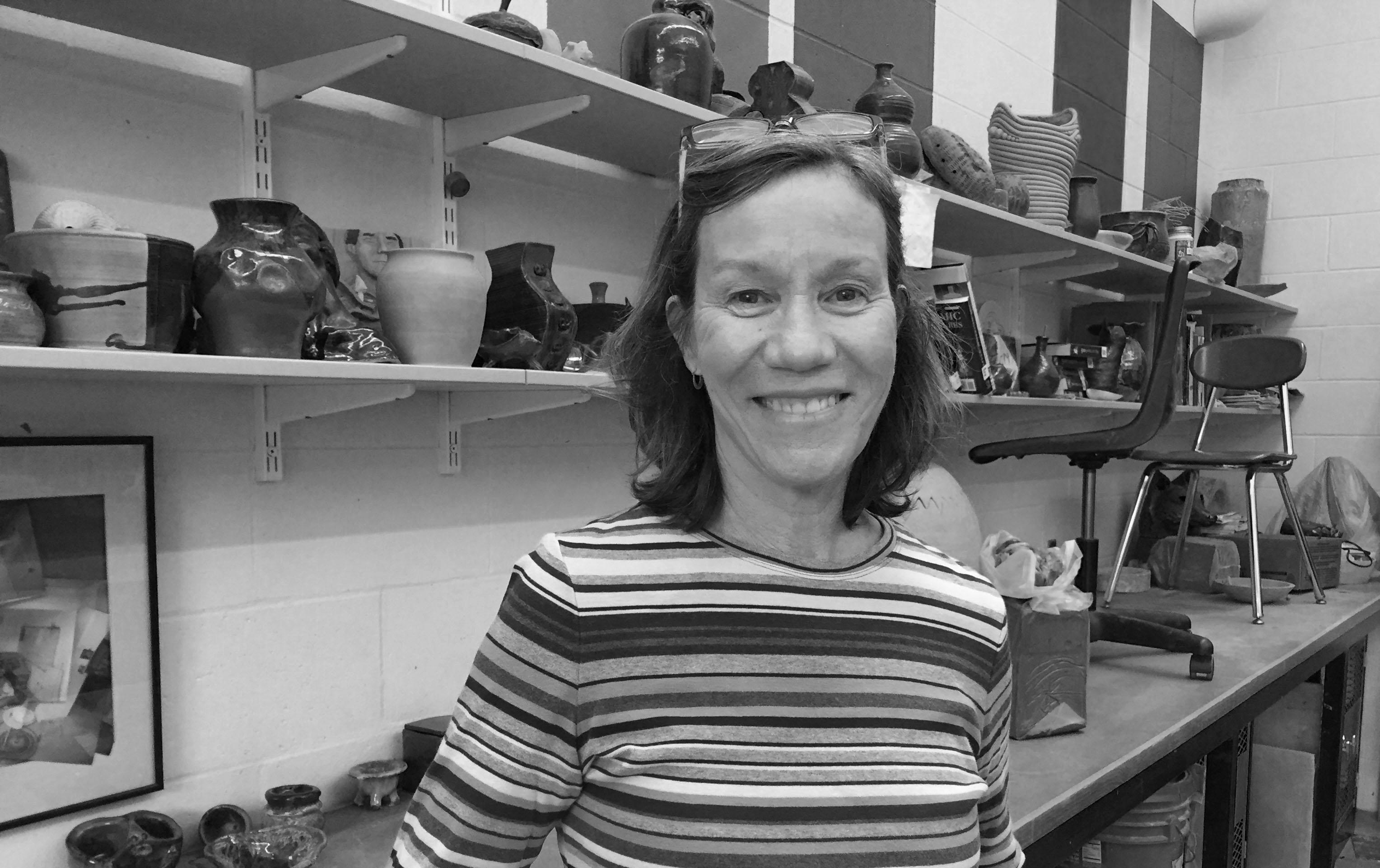
Rochester, New York, where she worked for six years.
“It was very much like Oyster River. It was bigger but it was in the town that the University of Roch ester was in so we had a lot of really high-achieving students, a lot of faculty from the University and their c hildren so we had the influence of the uni versity which we have here,” says Bilynsky. “I know one of my first photography students from Brighton High School in New York started taking a photog raphy course and loved it so much and today she’s a filmmaker and she’s won awards for film making.”
Bilynsky continues to inspire her students and de velop great relationships with them. One student in particular is alumna, Amanda Souvanneseng (‘14). Souvanneseng left college to pursue her dream of an art career. She’s been living in Boston for the past two years making a name for herself in the art world. Souvanneseng is working on several projects right now, such as designing cleats for New England Revolution soccer player, Lee Nguyen, and paint ing a landscape for Nguyen’s teammate, Kelyn Rowe.
“If there is one thing that the art department at Oys
ter River taught me it is to always follow your heart. Put passion and drive behind whatever it is you want to do and you can accomplish it,” said Souvannaseng.
Bilynsky and the art department have had huge im pacts on students’ lives, allowing them to let loose and have a fun class to look forward to in their school day.

“Mrs. Bilynsky is a very honest teacher so she will tell you when you need to adjust some thing in a painting, but she’s always sweet about it. Mrs. Bilynsky really cares about all her stu dents; it’s very obvious,” says Maddy Lavalley (‘16). Bilynsky is always willing to go the extra step to help her students be the best they can.
“She works during her free time on student’s piec es and I think that’s very admirable,” says Madi son Cooper (‘16). “She’s a very sweet teacher and tries to help you get to a better place with your art.”
Students’ have admired Bilynskys teach ing style for the past twenty years.
“Her teaching style is what every teacher should be like. She creates an atmosphere that encourages people to try their best while always having a smile
on her face. She’s easy to talk to and one of my fa vorite teachers at this school,” says Ryan Coxen (‘17).
This year will be the twentieth year she’s worked as an art teacher at ORHS. Twenty years ago, Rosi was a junior in high school and Lawrence was just beginning his teaching career here at ORHS.
“What I love about teaching here is the people. Work ing with Ms. Rosi and Mr. Lawrence is just so easy; we collaborate and are usually on the same page,” says Bilynsky. “We share ideas, students, and help each other.”
Oyster River’s art department has brought these three talented artists together creating an open and fun place to be creative and give students a break from sitting at a desk. They work very well together and have created lifelong friendships.
“I’m so lucky that we not only work together, but she’s also one of my dearest friends. She loves to laugh and have fun and she always makes you feel like she really wants to spend time with you. We’ve had many fun adven tures over the years, both in school and out,” says Rosi.
Here at Oyster River we congratulate Mrs. Bilynsky on twenty years with us and wish for many more.
Betsy LarsonAt this time of year, every year, seniors are focusing on what’s next. And many seniors are awaiting news from their college of choice. At this point, however, college is just something high school students just envision in their heads. But what is college really like? Read on to find out from seven ORHS 2015 graduates:
Charlotte Moore is attending Georgetown Uni versity and majoring in Political Science and English and is debating a minor in French. Moore has found a close group of friends and has fallen in love with DC adding, “You really can’t beat Washington, DC in terms of the opportunities I have available to me.”
Moore says there are a few distinct differenc es between college and high school. “Oyster River is a great school full of really talented kids, but all with a wide range of interests and ambitions,” she says. “What really struck me coming into George town is that all of my peers have similar goals and
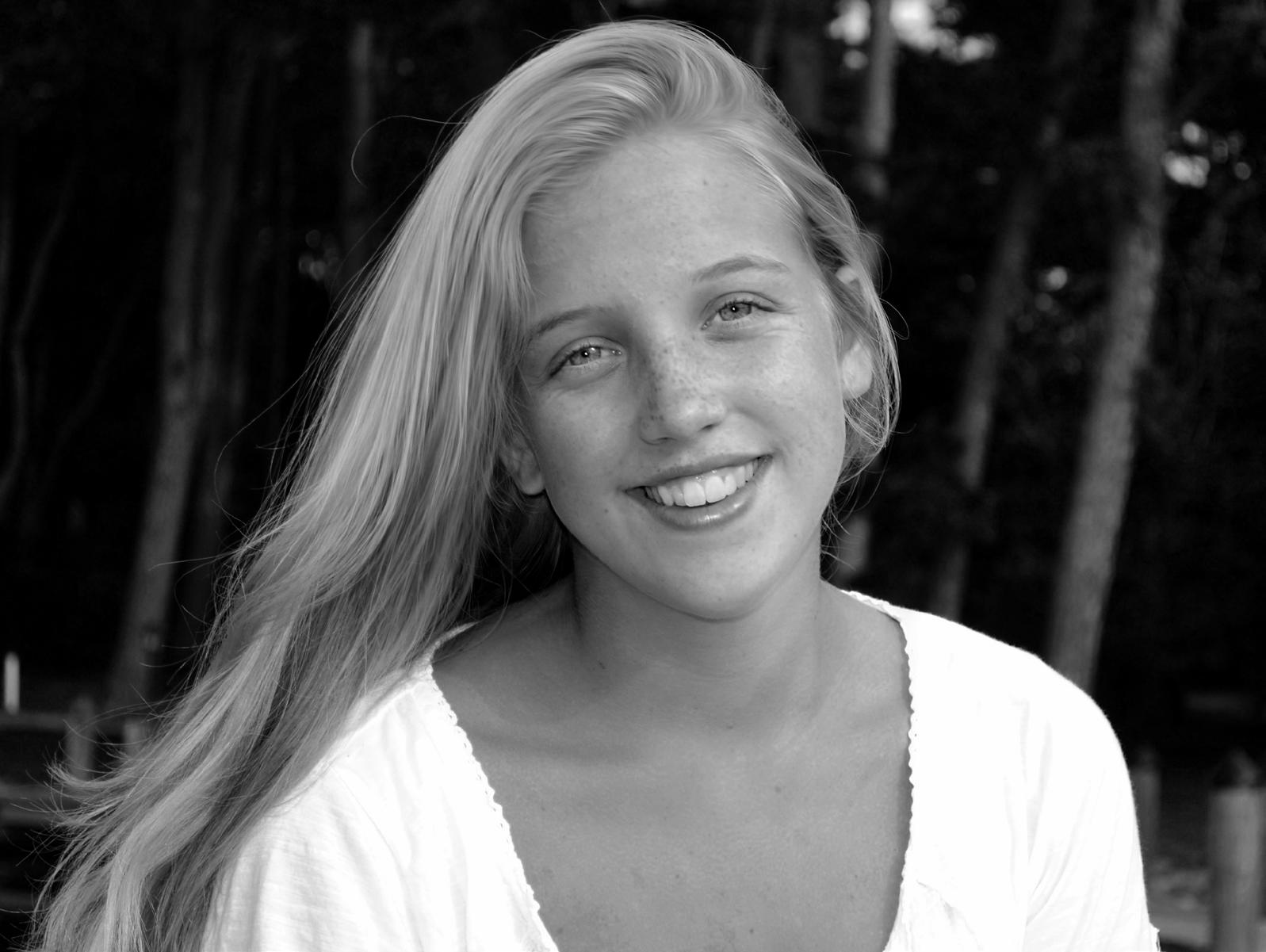
values to mine, which has really forced me to chal lenge myself on this new playing field,” adds Moore. Another piece of advice she gives is to not sell your self short. “When I was applying to colleges, I sort of boxed myself into what I thought was what I wanted to be. This certainly narrowed my college search to be more manageable (I focused on smaller liberal arts colleges) but at the same time set boundaries that kept me from exploring other colleges and universi ties I might be interested in.” In the end, Georgetown was the perfect place for her, so it worked out, but she adds, “You’ll never know if you don’t give it a shot.”
Owen KurtiakNeil Thomas is attending Edinburgh University in Scotland. He is getting his masters in Medicinal and Biological Chemistry. Thomas chose to do some thing out of the ordinary by going to school in anothercountry. “I would definitely recommend branching out to other students,” says Thomas. “I think it’s important to immerse yourself in cul tures that are different from what we’re used to. Also, being in the EU as a stu dent is amazing because it opens up all of Europe to really cheap travel.” Being in
a different country, Thomas had to learn some of the different words and terms. He also added that the university is very career-oriented instead of teaching just information to students. “The teaching method here is very intense and focused, so we study very specific topics, but we delve very deeply into them. It definitely took a while to get used to the different style and different names for things, but I think high school definitely gave me a good base from which I could pursue al most anything I wanted,” said Thomas.
Leah Mueller is attending Quinnipiac University in Connecticut and is study ing Management. When Mueller first toured Quinnipiac it was her junior year in high school. She says she hated it and never saw herself going to that school, but then later went back her senior year and fell in love. “I left QU on my list. When I was accepted I came back for a second look at the school and fell in love. I was so happy that I didn’t rely on my first impression of the school,” said Mueller. Joining either a fraternity or a sorori ty can be a crucial step to settling down into one’s college experience. Mueller had no intentions of joining a sorority at first but with her roommate pestering her to join, she gave in and didn’t regret it one bit. “I think that joining Kappa Delta has been one of my best choices at school.

I am also part of the Dance Company at school at that has provided me with many opportunities,” Mueller added. Muller says that the classes in college are different in many ways to the class es in high school. Her teachers don’t wait for every student to copy all of the notes down or remind students what the homework will be. It takes a lot more self-accountability than in high school. Mueller adds, “I have found that college is nothing like my high school experi ence. The professors at my school didn’t walk me through anything. The profes sors expect you to do the work without reminding you or even telling you some times. Many of my teachers at high school would write what is due on the board at school. Now I rely on what is writ ten on the syllabus and on blackboard.”
Cam Barth is attending Elon Universi ty in North Carolina and he is majoring in Finance. So far he is enjoying his freshman year. “It’s been very different from high school though. Classes are spaced out dif ferently than high school. You spend less time in class but more time doing home work compared to high school,” says Barth. One thing that surprised him is that in col
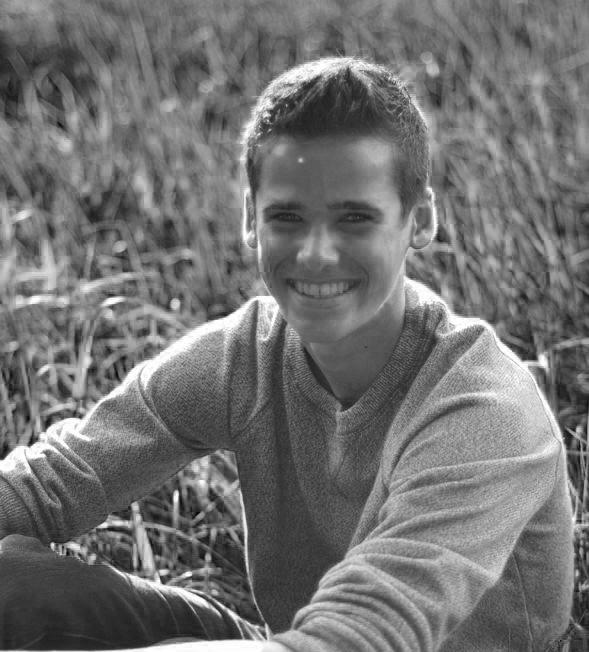
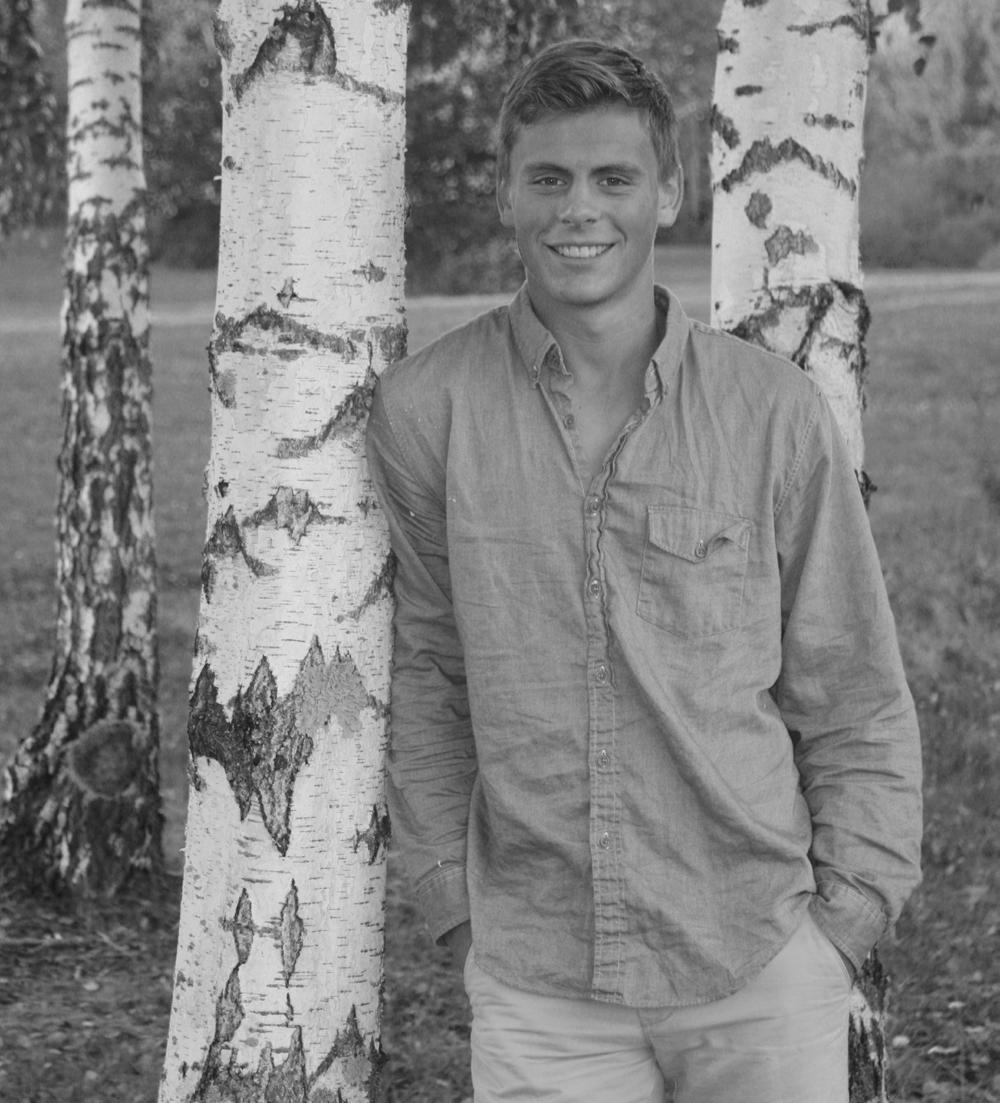
lege students are expected to know all the material on a topic (or in a textbook), even if it was never covered in class. Barth adds, “This meant that I had to read each chap ter of the textbook diligently, something I could get by without doing in high school.”
“It was a little hard at first to be go ing to school far away from home, but I adjusted quickly,” explained Barth
Bryce Schultz is attending Colby Saw yer College in New London, NH, and is majoring in Business Administration. Schultz, who was a co-captain on the ORHS soccer team, is playing Division III soccer and has this to say about it so far: “I got to school two weeks early for preseason, which helped me get situat ed with campus as well as my dorm be fore my classes even started. Being on the soccer team also helped give me a big friend group right off the bat, which gave me a sense of belonging and helped me feel more at home in what at the time was an unfamiliar environment.”
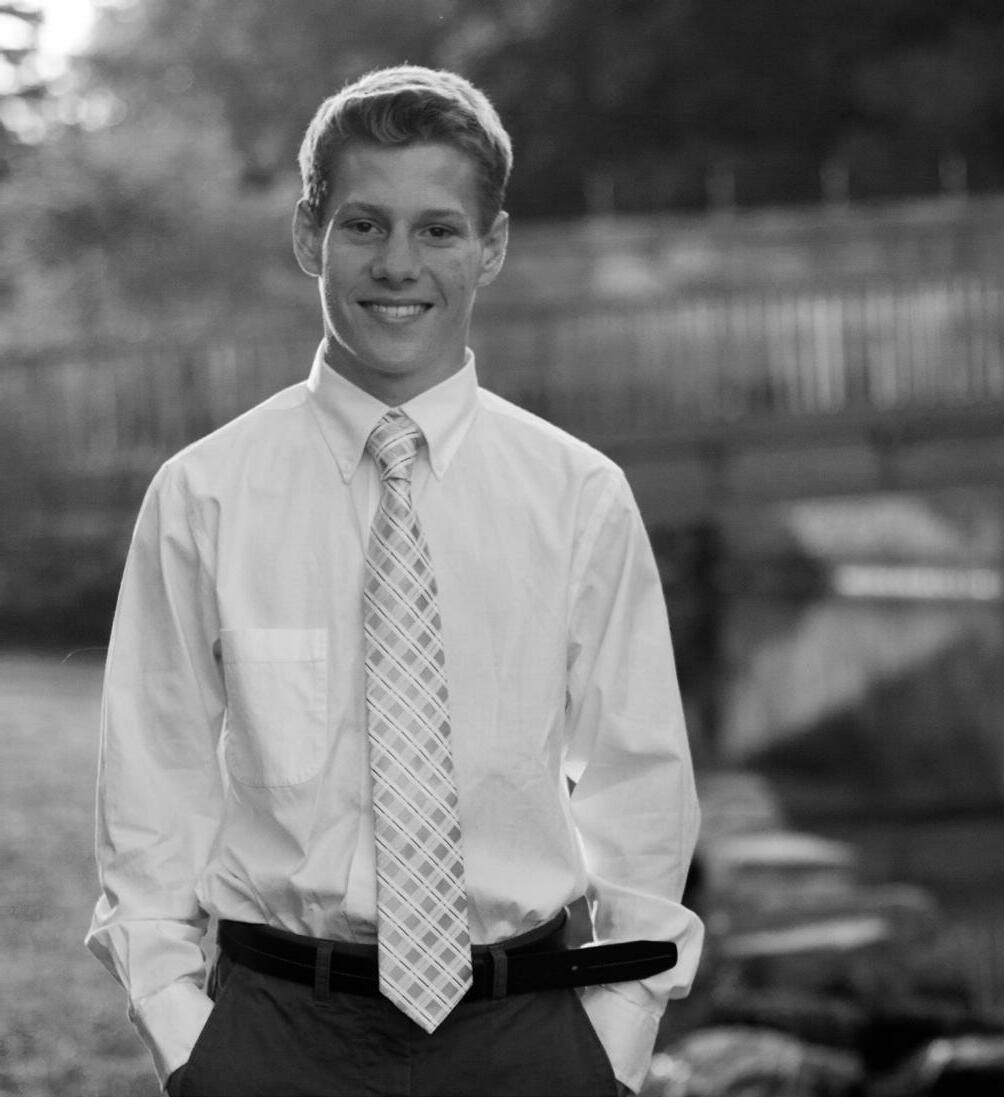
Aside from the soccer side of things
Pieter Zwart is attending George Wash ington University (GW) in Washington DC and is currently majoring in Interna tional Affairs and thinking about a minor in Sustainability, Spanish, or Economics. Zwart is enjoying his freshman year of col lege so far though he admits there was a period of adjustment. Academically, it took him some time to find his niche at GW. “I made the switch from studying Mechan ical Engineering to International Affairs, which was a pretty significant turnaround but it’s a decision I’m glad I made.”

For some students it can take a bit of time to make the switch from the high school lifestyle to college. “College is different from high school in that it is almost entire ly self-directed,” offers Zwart. “You create your own schedule, decide how to allot study time, choose to get involved with or ganizations, or even figure out what you’re going to eat for dinner. I’d say that so far the most important things I’ve learned in college have been time management and
Shultz is finding his first year in college very manageable. He feels that Oyster River gave him the workload that resem bles the workload in college and that al lows him to have a fairly open schedule. “I have numerous classmates who feel the workload in college is excessive but I often received a similar workload from ORHS.”
Schultz has this to say about looking at colleges: “I would recommend doing a couple overnight visits if it all possible to gauge if it’s the right social scene for you. Many colleges will offer a very dif ferent, more picture-perfect vibe on bro chures and day tours than what you can see for yourself on an overnight visit.”
organizational skills.”
GW is located in downtown DC and Zwart says that living in the city is a bless ing and a curse. “It’s exciting being in the nation’s capital and the air around DC is always buzzing with important people doing important things. It’s great for in ternship opportunities, restaurants, and weekend excursions but it can definitely be overwhelming at times. It’s refreshing to take a break and leave the city for a walk in the woods or just to hang out by the river.”
Zwart offers this advice to kids applying to college: “Don’t confine your decision-mak ing process by statistical comparisons or school rankings. Try to find a place that encourages you to become the best version of yourself.” He advises to visit campus and talk to the students who go there to see if you connect with them. “Meeting new people, getting involved in organizations, and attending events off-campus have been the most exciting parts of my college experience so far,” he says.
Fran Jeffrey is attending the Universi ty of New Hampshire. She is majoring in Family Studies with a five-year masters in Elementary Education. Jeffrey is also minoring in Special Education and Dance. Jeffrey is liking the freedom that comes along with college. “There is no one there telling you to clean your room or to eat your greens. There’s a lot of stuff you have to figure out on your own,” she says. She is finding that attending Oyster River High School prepared her perfectly for college. “Some people are overwhelmed by the lack of specific guidelines or the freedom to write your own opinion, but I

feel comfortable because of the education I was provided during high school,” adds Jeffrey.
When giving advice about applying to college Jeffrey has this to say: “I would say to listen to your gut. I was so stressed about choosing a school. I chose 13 schools and toured all over. I didn’t want to be the Oyster River girl who ended up at UNH. I thought it was lame and expected.”
In the end, Jeffrey is glad she chose a school close to home. She has found a close-knit group of friends that she gets along with really well and is enjoying her freshman year.
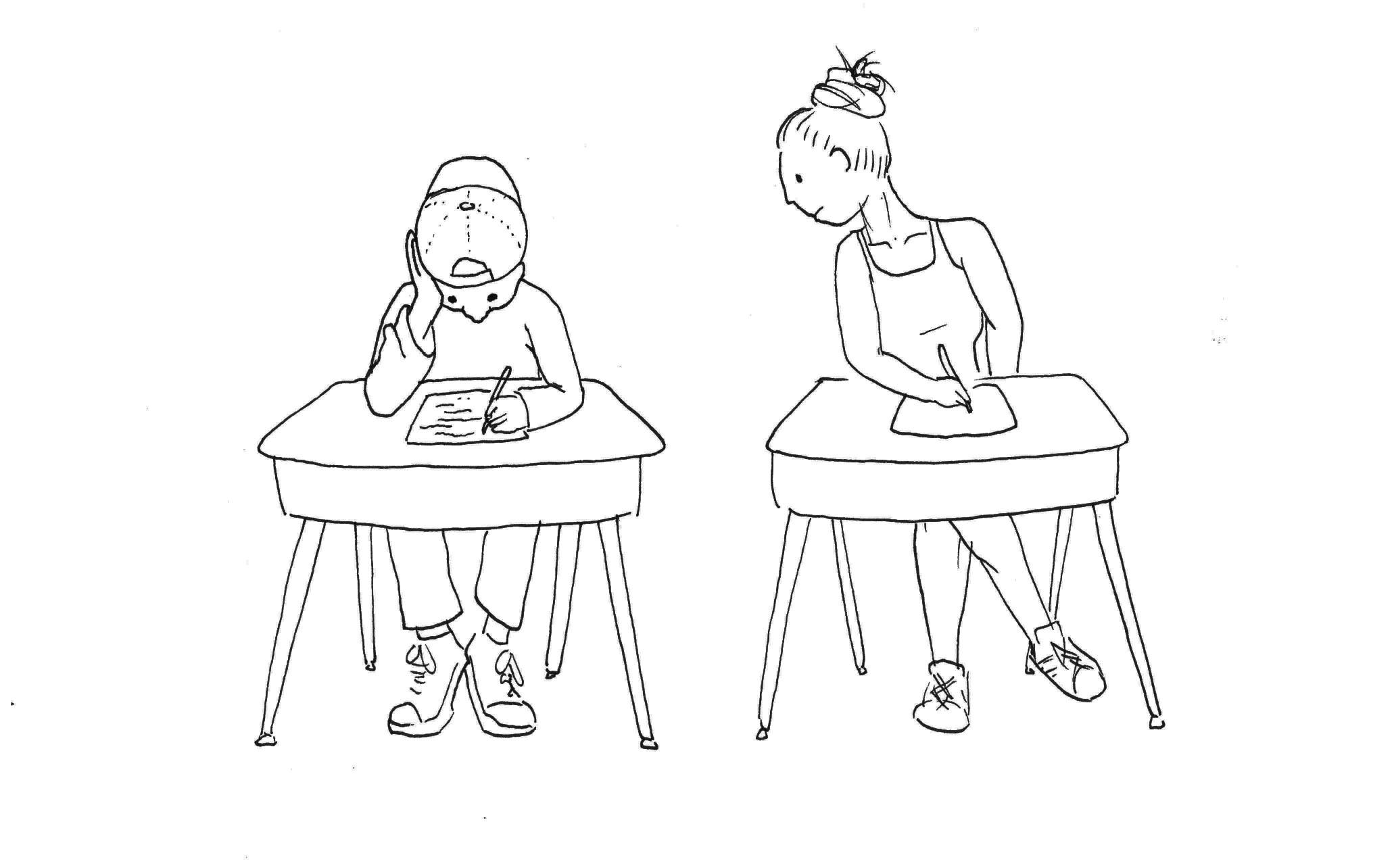
Stroll through the cores or hallways of Oyster Riv er High School on any given day, and you will see hurried students crowded around a sheet of paper vigorously copying the work of someone else be fore they head off of to class.
Cheating. Most students have done it at some point [or anoth er] in their academic careers. Whether it’s wandering eyes during a math test, formulas written on the back of a hand, or trips to the bathroom to check answers on their phone, the possibility to cross the line of academic honesty is always present. Even for hard working honest students sometimes all it takes is a stressful week and having the possibility of a lowered GPA to be tempted to cut corners on school work.
However, it seems that with today’s technology, cheating and plagiarizing are becoming easier and more prevalent than ever before, and there seems to be no fine line between what is cheat ing and what isn’t cheating among students.
“Most of the cheating that I think happens at ORHS is just copy ing of homework, graded assignments or using sources like spar knotes and things like that. I’m not someone who would ever look over at someone else’s test but sometimes I will completely forget to do an assignment and I would rather text a friend and get the answers from them instead of taking a zero in powerschool,” says one anonymous ORHS student.
In Pam Raiford’s sociology class, she asks her students if they have cheated and nearly everyone in the class raises their hand and the immediate response following this is how Raiford is de fining cheating.
Does copying homework that is only checked for completion not accuracy cheating? Is asking students who have taken a certain test questions about the test cheating? Is forgetting to cite one source in your paper cheating? Is reading sparknotes for a certain book cheating?
The list could go on and on with the same answer.

Yes all of these things are cheating, but they all differ in severity and popularity. There are many different factors that go into the decision of how and how much students are going to cheat.
“Some classes I just have to take to get a credit and so I just
don’t care about the information and so it doesn’t feel that wrong to be asking kids that have taken it in the past for their notecards or old tests. In the end it just saves me a lot of time and if I am not interested, than what is the harm.” says an anonymous student. The honor code of academic honesty has become so minimal, most students know that cheating is wrong but the need to not fail overpowers that belief.
“If I have a teacher that actually cares about what they’re teach ing and are actually trying to engage students and I have a rela tionship with them then I won’t cheat in the class, but I don’t feel bad copying homework or something for a class with a teacher that doesn’t even know me,” says one student.
It seems that for most students the need to cheat comes down to three things, procrastination, fear of failing, and stress or work load.
“If I put off a big paper or studying for a big test I will normally ask other people for what they did. I won’t copy their whole paper but it’s nice to have that guideline of what I should be doing and if I can’t get someone’s paper there are plenty of websites to use that can fill in the gaps for me. And if it’s a big test for a class then I will normally ask around for a notecard or ask someone for their graded assignment or quizzes to study from. I don’t think I really get judged for doing these things because what I do to help keep my grades up is pretty common,” says one student.
With such a heavy workload and a variety of other activities the stress adds up for students.
“I like to think I am an honest person and a good student but sometimes I will have so much homework and there’s just not enough hours in the day to do it all. So I will do the important stuff and then I will copy someone else’s work for assignments I couldn’t squeeze in,” says one student.
When administration is asked if they think cheating is prevalent most say that they know it happens but that they don’t think it happens too much. What is interesting is that when most teachers or administration are asked what drives student to cheat it’s no secret that stress and workload are factors.
“There is a pressure to succeed, and people are thinking about college and getting better grades than everyone else and about that competitiveness. And then there is parental pressure, and pressure from themselves or peers,” says ORHS Principal Mike McCann.
ORHS social studies teacher Dave Hawley agrees, saying, “I’ve been here for fifteen years and there has been a sizeable shift to wards emphasis on grades, the stress of that, and the specific tra jectory through the school. And that creates a crucible of stress for students where you are heated from all sides. Kids today are juggling school work, sports, social life and a continual drip from their smart phones. There is parental pressure, college pressure, classes you need to take to get into college, and that might force you to do something that you might otherwise not do. Then the content is just an obstacle to your freedom and that is a total bummer.”
As far as consequences of cheating each department handles the situations differently.
“The teacher is the first line of policing so a lot of the times that there is plagiarism happening and the teacher is handling it in house and it won’t even get to our level. Certainly larger exam ples due get to us, but it is a case by case scenario,” says Dean of Students and Athletic Director Corey Parker.
Both teachers and administration feel that each situation is dif ferent and that depending on the weight of the act the punish ments can change. Most of the time administration doesn’t hear about cheating situations and the teachers handle the situation on their own.
It seems to teachers that their is only so much cheating they can catch. That doesn’t mean they don’t know it is happening, there is just only so much they can police.
“I’ve caught kids cheating and it sucks. To a degree you wonder if you are not doing enough for the student and that’s why they are cheating,” says ORHS math teacher Chris Kearney.
When teachers do find students cheating the worry about what students are losing from cheating comes to mind.
“You’re not writing because I want you to write. You’re writing so you can get better at it, faster at it and can get your thoughts on the page. The more you write or read the more you create your own style. That’s your own signature and that separates you so much. When someone can’t write in the professional world you can’t believe that, and we’re not talking about the effective use of a comma or whatever we’re not looking at that, but the ability to articulate complex thoughts in a coherent way with a little bit of
your own voice. That’s masterful, and that will basically send you into a position where folks are going to think you’re component,” says Hawley.
Hawley then continues saying, “But that needs practice and people look at it as an obstacle. It bums me out because they are missing the point of what I am trying to do. All of this stuff is a vehicle to create your knowledge of the world and the ability to analyze and communicate your position on it.”
As the access to resources increases, the stress students have and what the teachers are actually able to police is clearing way that the issue as a whole needs to be relooked at.
“Cheating goes beyond just lazy kids. Even the smartest kids I know that have a great work ethic will still do things that some teachers would call cheating. It’s scary to see the lack of confi dence and fear of failure in so many students,” says an ORHS student.
So if teachers, students and administration know that a lot of cheating comes from students having too much work to complete or too many pressures or standards to uphold shouldn’t we work to improve that so students have less of a need to cut corners and can actually learn the skills and information the assignment is supposed to teach?
There is a common misconception that the students that are cheating are the students who slack off and don’t do their home work, take notes or rarely come to class. This is false. Regardless of the class or the student there has always been cheating going on, but just because a student is intelligent does not mean that they are not cheating.
Cheating is no longer an issue for students that lack of knowl edge or intelligence. It is an issue that now also stems from the insane need to perform at ORHS, the fear of failure and the lack of self confidence. Smart students aren’t confident in their work, smart students are turning to others to see the answers to a grad ed assignment or checking sparknotes about a certain chapter in a book. Cheating isn’t limited to laziness anymore. The issues and reasons students are cheating has evolved into an issue that speaks largely about the huge desire to succeed.
“It’s more complicated than just cheating. Cheating is just a symptom to something bigger,” says Hawley.

The NH minimum wage should be raised. We are among the lowest in the country and we have no reason to be. It doesn’t set a great precedent.

We are better than the federal minimum.
America is supposedly the land of equal op portunity for all, no matter your social standing. However, nearly 80 years after minimum wage was created we still face the issue of American workers not being paid enough. In February 2014, the Congressional Budget Office estimat ed that raising the national minimum wage to $10.10 an hour from $7.25 would lift over 900,000 people out of poverty.
The topic of raising the federal minimum wage has been debated for many years, but despite the overwhelming ev idence that it would help many people that fall below the poverty line, it remains the same.
The current minimum wage in New Hampshire is $7.25 per hour. If you work full time and are paid minimum wage you make less than $300 dollars a week. This is hardly enough to pay rent, let alone pay for bills and food.
On average, a full-time minimum wage worker makes $14,500 a year, which leaves too many families struggling to make ends meet. A family of three living off of mini mum wage is well below the poverty level. Many states have begun to adopt laws to raise the minimum wage and make the standard of living better for full time workers who are being paid less.
Some people believe that raising the federal minimum wage would hurt our economy. However, a recent study by the Federal Reserve Bank of Chicago showed that if low income families are earning more they are more like ly to spend it which in fact helps the economy. “I think it should be raised. Not necessarily for high school kids like me who don’t have to pay bills, it should be raised because there are people who don’t have an option other than a minimum wage job. There are too many people on welfare and they can’t get off of it because currently a minimum wage job doesn’t give them enough money to properly live without assistance,” says Shane Chinburg (‘16), an employee at Hannaford’s in Durham.
Every person working full time should be able to sup port themselves or their family. We live in a society where people are expected to be able to provide for themselves and the price of living has certainly increased. With such a low minimum wage many people have fallen below the poverty line. In a country where there are many techno logical, educational and social advancements it is expect ed that we can support our people.
“I work with people who pay rent and college tuition and I just don’t think that minimum wage is high enough
for them to pay their bills,” says Ali Beauregard, a soph
omore at Dover High School who works two part-time jobs.
In the 2015 State of the Union Address President Obama stated, “Of course, nothing helps families make ends meet like higher wages…and to everyone in this Congress who still refuses to raise the minimum wage, I say this: If you truly believe you could work full-time and support a fam ily on less than $15,000 a year, go try it. If not, vote to give millions of the hardest-working people in America a raise.”
The minimum wage in Massachusetts was recently raised from $9 an hour to $10 an hour. Across Ameri ca, the need for a higher minimum wage is increasing. Low-paying industries such as retail and food prepara tion account for 44% of jobs, according to a report from the National Employment Law Project.
“I think a lot of people have benefitted from raising the minimum wage. I know it will fix a lot of issues that have to do with poverty,” says Massachusetts resident Paige Hoffman.
Most teenagers working part-time jobs during the school year and into the summer would like to see their wages go up. Some studies have shown that high min imum wages lead to low employment for teenagers be cause employers want more experiences workers. De spite these studies, most teenagers seem to be motivated to work by higher rate.
A lot of students agree that raising the minimum wage would be helpful not only because they want more pocket change, but because they are trying to pay for school or rent. “I know a lot of coworkers who have to work their way through college and I just don’t think minimum wage provides them with enough money,” says Emma Sassa man (‘17), an employee at The Fresh Press in Portsmouth.
Most people would agree that raising the minimum wage would benefit the country as a whole. Many corpo rations exploit the minimum wage by hiring a surplus of employees and not paying them enough. In order to fix this issue and lift people out of poverty the federal mini mum wage must be lifted.
“I think the NH minimum wage should be raised. We are among the lowest in the country and I think we have no reason to be. It doesn’t set a great precedent. We are better than the federal minimum,” says Laura Rothstein, a Durham resident.
Lydia ConcannonIn the past year, the Confederate flag has sparked a lot of controversy. After the racial ly charged Charleston Church shooting on June 17th of 2015, many demonized the flag. After much deliberation the South Carolina governor had the Confederate flag that flew in front of the capital building removed. While many saw this as a step forward, a number of people still fly the flag to represent the South’s history and as a way to exercise their freedom of speech, but is this the most appropriate way to express these ideas?
The flag, known to many simply as The Confederate flag, is in fact one of the more ob scure flags of the Confederate states. The true flag of the Confederacy was the “Stars and Bars” with the Confederate flag being exclusively used in battle. The flag was actually relatively unused until it was reintroduced during the civil rights movement. “When it was flown, it was very obvi
ously in opposition to the [civil rights movement],” states J. William Harris, a professor of history at UNH specializing in black history. The flag was used by white supremacy groups such as the Ku Klux Klan and all others who opposed the civil rights movement. The flag became an undeniable sym bol of hatred and prejudice against those of colors.
There are valid reasons to some that justify the public display of the flag. “I fly it because it was a part of our country’s history. I don’t really fly it for any reason besides that... I don’t believe that slavery and all that was good, but it was still a part of our history.” said Chris Gobron (‘17), an Oyster River student who flew a Confederate flag off his truck for a short period. Many fly the flag in remembrance to Southern history, or Southern heritage, instead of the racist ideals of the Confederacy.
Though some think of this as a valid reason, in this day and age displaying symbols such as the

Confederate flag in public is unacceptable.

This symbol has a history rooted in hate, and saying you’re flying it to remem ber Southern heritage still doesn’t change the fact that people will see the flag and see the owner as a racist. If one truly wanted to represent the historical significance of the Confederacy, why would you not fly its official Stars and Bars flag?
“At this point, after the 1950s, you can’t pretend that it is not a symbol of racism,” continues Harris. “People sometimes will say that they are going to put it up, and that does not mean that they individ ually are racist, but one person can’t decide what a symbol means.” If one were to brandish a Nazi flag, not as a symbol of anti-semitism, but rath er to pay tribute to the Swastika’s Native Ameri can roots, that would still be racist. Because of the Nazis’ crusade against Judaism, their flag will forever and always represent hatred against that religion. Therefore, “one cannot fly a Confeder ate flag and deny that it stands for racist policies.”
When you express an idea or symbol, you have the right to free speech. But it is well within the rights of others to express their thoughts. A misoginist rally was scheduled in Portsmouth in February of 2016. Seeing this as unacceptable, a
protest of the rally was scheduled to run simulta neously. Thankfully, the initial event was cancelled after substantial blowback from the public. It should be noted that when you exercise your rights to free speech, it is still well within other’s rights to criticize you, such as calling you a racist or bigot.
In addition to a message of hate, the flag carries a treasonous meaning. “This [flag represented a] group of people that took up arms against the le gally constituted government of the United States,” states UNH American history professor Jeffrey Bolster. Having represented the Confederacy’s rebellion and attempted rise to power, the battle flag stands for a failed secession by a government that possessed racist policies. After the fall of the Nazi party, the swastika was banned by the German government and hailing the flag was considered treason. Though we as a country have not gone that far, some states such as California have restricted the flag’s sale and display. Mississippi remains the only state flying the flag in front of their statehouse. Certainly, free speech is important, and should not be infringed upon, although there are some circumstances where while being completely legal, it is subject to op position. When Neo-Nazis parade with swastikas or the Westboro Baptist Church preaches homophobia at pickets outside schools and memo rials, it is well within their rights to do so. But by utilizing free speach to project hate, you are subject to criticism. The same freedom granted to you is shared by all those who oppose your message. So don’t be shocked
next time someone calls you a bigot.
the
“At this point, after the 1950s, you can’t pretend that it is not a symbol of racism... people sometimes will say that they are going to put it up, and that does not mean that they individually are racist, but one person can’t decide what a symbol means.”
-J. William Harris
We live in a generation where people feel the need to be connected at all times. We are expected to re spond at all hours of the day and constantly be en gaged with others, but is the need to respond all the time posing a threat to our safety?
Every day 11 teenagers die as a result of texting while driv ing. Most people learn even before they start driving that texting while driving is dangerous. Multiple laws have been passed to try to stop drivers from this habit but people are still being hurt by it.
If so many people know the dangers of texting while driving it poses the question as to why they still do it? Everyday, people risk not only their lives but the lives of others to send a text. You have to ask yourself; is it worth it? Is looking down at my phone for 5 seconds worth my life?
The answer should be simple; no. Most people believe that tex ting and driving isn’t that dangerous. According to the American Automobile Association (AAA), you are six times more likely to get into an accident while texting and driving than while drunk driving. In fact, reading or sending a text message decreases your reaction time more than if you had over the legal
limit of alcohol.
“I think that people think they can multitask more than they actually can when they are driving,” says student driver Audrey Duvall (‘17).
Some student drivers do believe that texting and driving is a bad thing and don’t participate in it. “My advice is to not do it. It can really mess up your life and even end it if you aren’t careful. It really just isn’t worth it,” says Molly Downey (‘17).
Although some drivers do not text and drive, a lot of people do seem to think that they are the exception when it comes to this issue. According to AAA 94% of teen drivers acknowledge the dangers of texting and driving, but 46% admitted to doing it anyway. Many teenagers and adults believe that they can multi task while driving, but in reality it is more dangerous than they can comprehend.

“I think I just do it because it’s easy. I don’t think I’d ever get caught doing it and it’s not like I take my eyes off the road for that long,” says an anonymous source who admits to texting and driving.
Technology has played a large role in the amount of people that
are texting and driving. The rise in the use of cell phones has caused people to feel the need to be constantly connected.
Most people instinctively answer their phone while in the car not even realizing that what they are doing is wrong. “People just feel the need to be on their phones all the time, even when they are driving,” says student driver Claire Genes (‘17).
The average time a person takes their eyes off the road while texting or going on their phone is 5 seconds, going 55 mph that is enough time to travel the length of a football field. You may think that you are capable of texting and driving, but nobody is capable of safely traveling the length of a football field without looking at the road once.
“They think they are capable of texting and driving and that it’s not going to result in either an accident or them getting caught,” says ORHS Student Resource Officer, Holly Malasky.
Multiple public awareness campaigns have arisen from this modern day epidemic. If you turn on the TV or drive down the highway you will see commercials and billboards warning people of what can happen if they decide to text and drive. AT&T launched a campaign a few years ago with the slogan “it can wait.” Many drivers may look at the warn ings and not think much about them but it really can wait. No text is worth your life or anyone else’s.
“People just don’t care sometimes. They think it won’t happen to me. They think they are invincible,” says Durham Police Officer, David Skel ly.
The unfortunate part of texting and driving is that most people don’t stop doing it until it is too late. “They won’t stop until something bad happens,” says Kevin Towle, a driver’s education instructor at ORHS. The National Safety Council reports that cell phone use while driving leads to 1.6 million crashes each year. Although some of the crashes ar en’t very serious the issue of texting and driving has very real conse quences.

In July of 2015 a new law went into place in New Hampshire requiring that all drivers remain “hands-free” while driving. The law prohibits the use of such devices even when the vehicle is stopped in traffic, such as at a stop sign, red light or traffic jam. It is illegal to read, view, post or compose an electronic message from a handheld device. The first offence (if fined) is $124, then $310, then $610. Drivers can also lose their license after two offenses.
The new law has been strictly enforced however the numbers of people texting and driving have not decreased significantly. “I think that peo ple initially were more cognizant of what they were doing and I think initially law enforcement went out in force to try to be able to enforce it. The reality is that people are still doing it,” says Malasky.
There is a simple answer to fixing this issue that has spread across the roads everywhere; stop doing it. Of course it is easier said than done, we live in a generation where people feel the need to be constantly con nected at all times, even on the road. The reality of the situation is that the consequences are far worse than the benefits. Your life is not worth a text.
